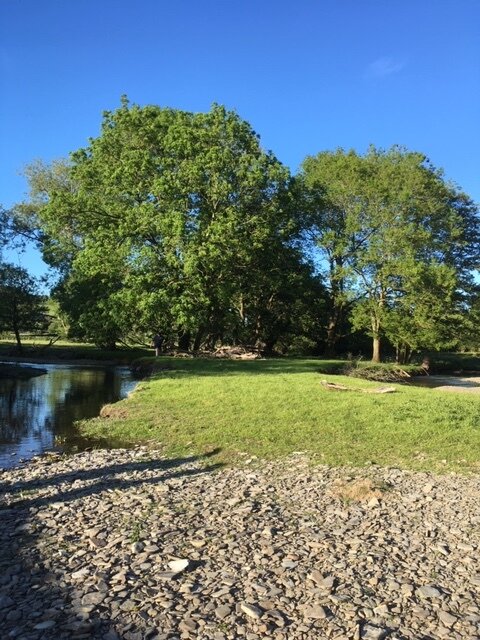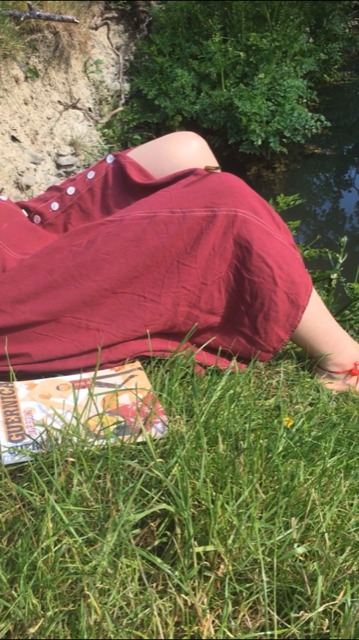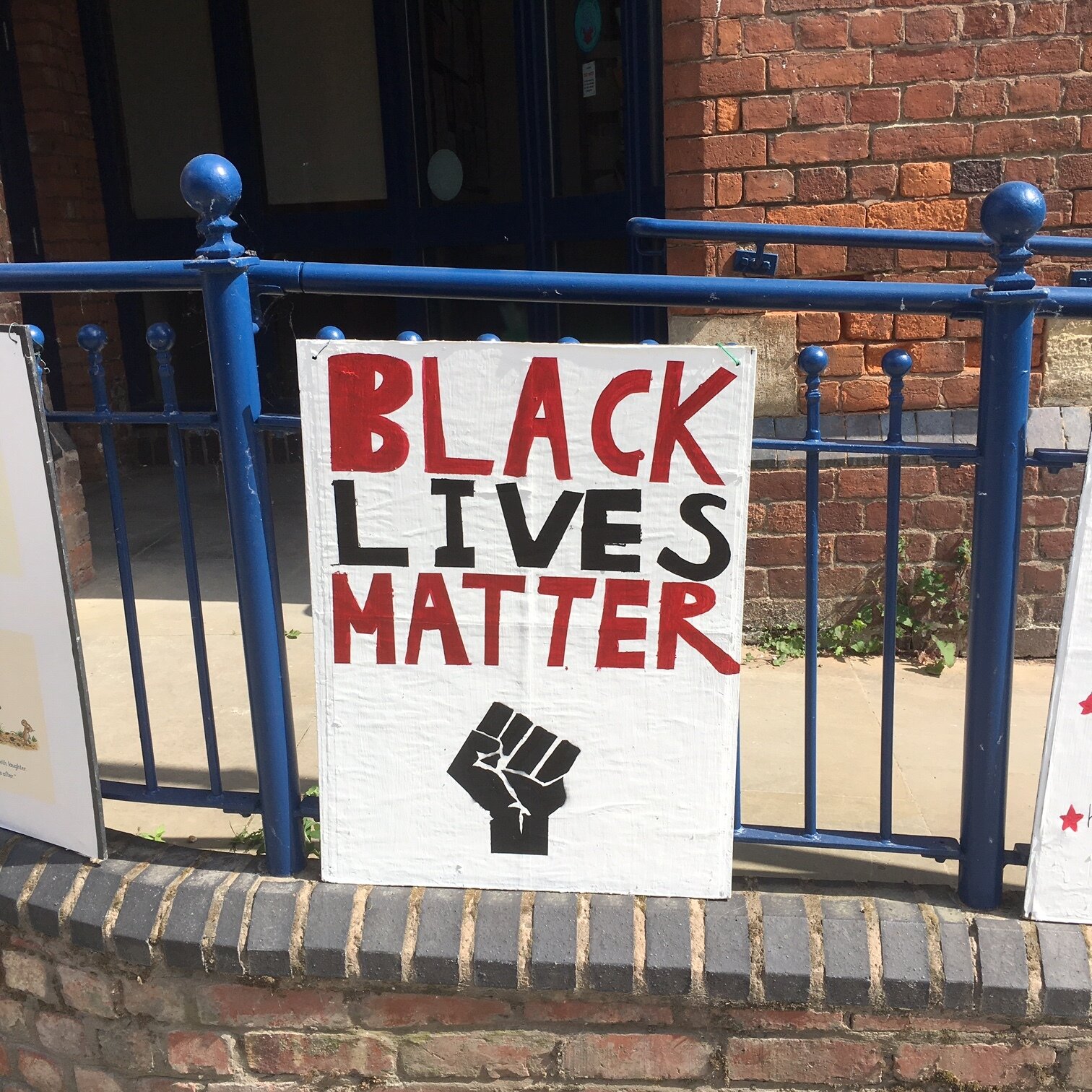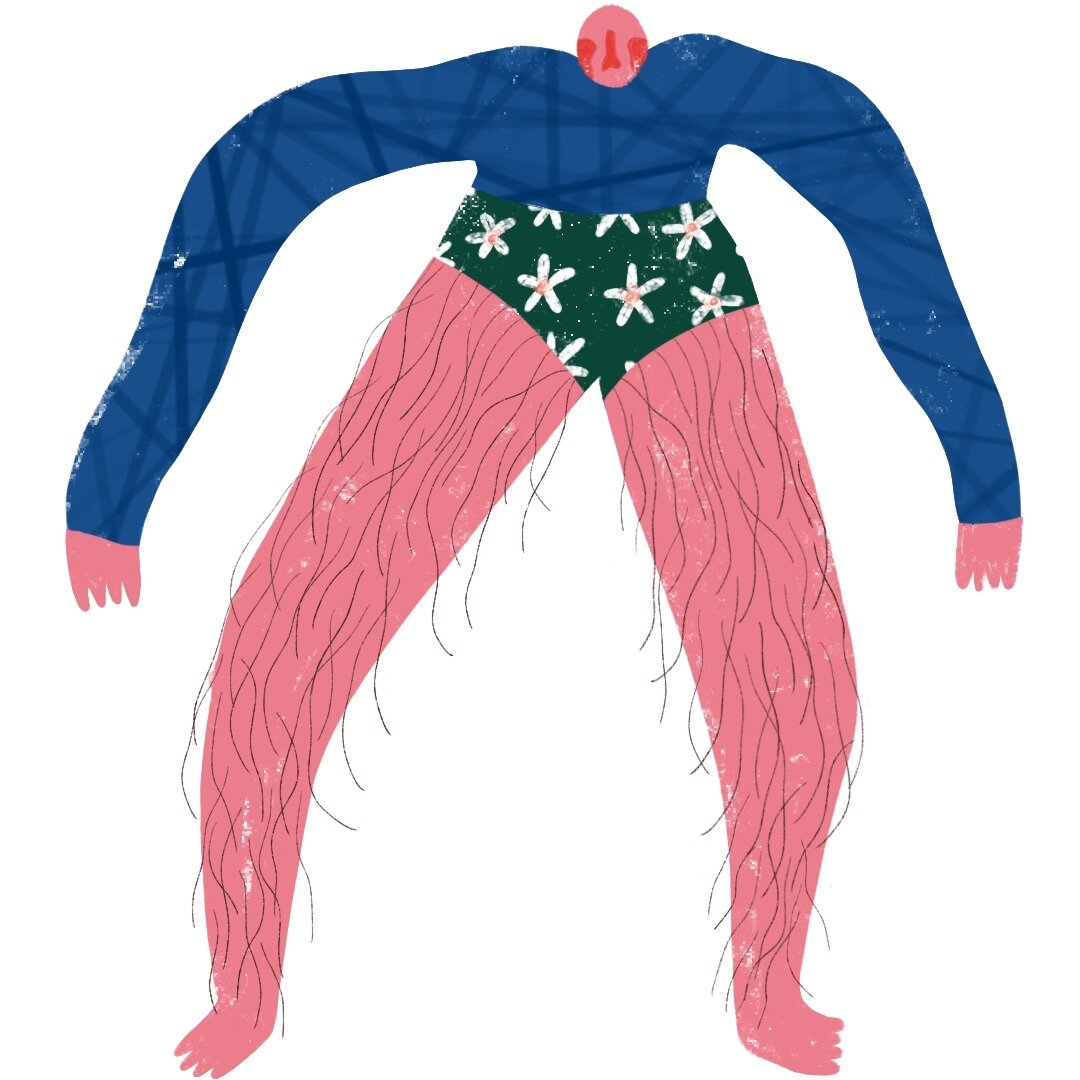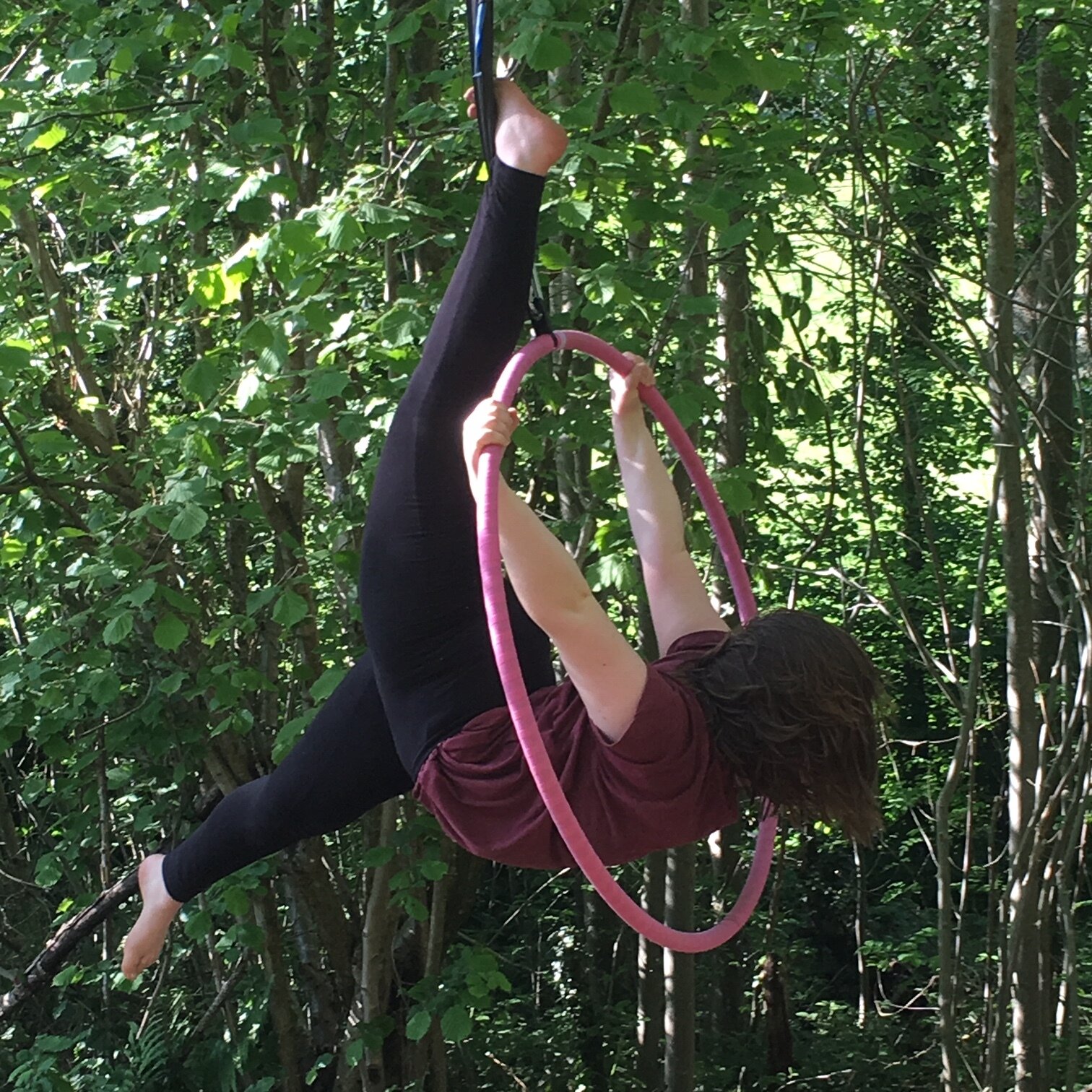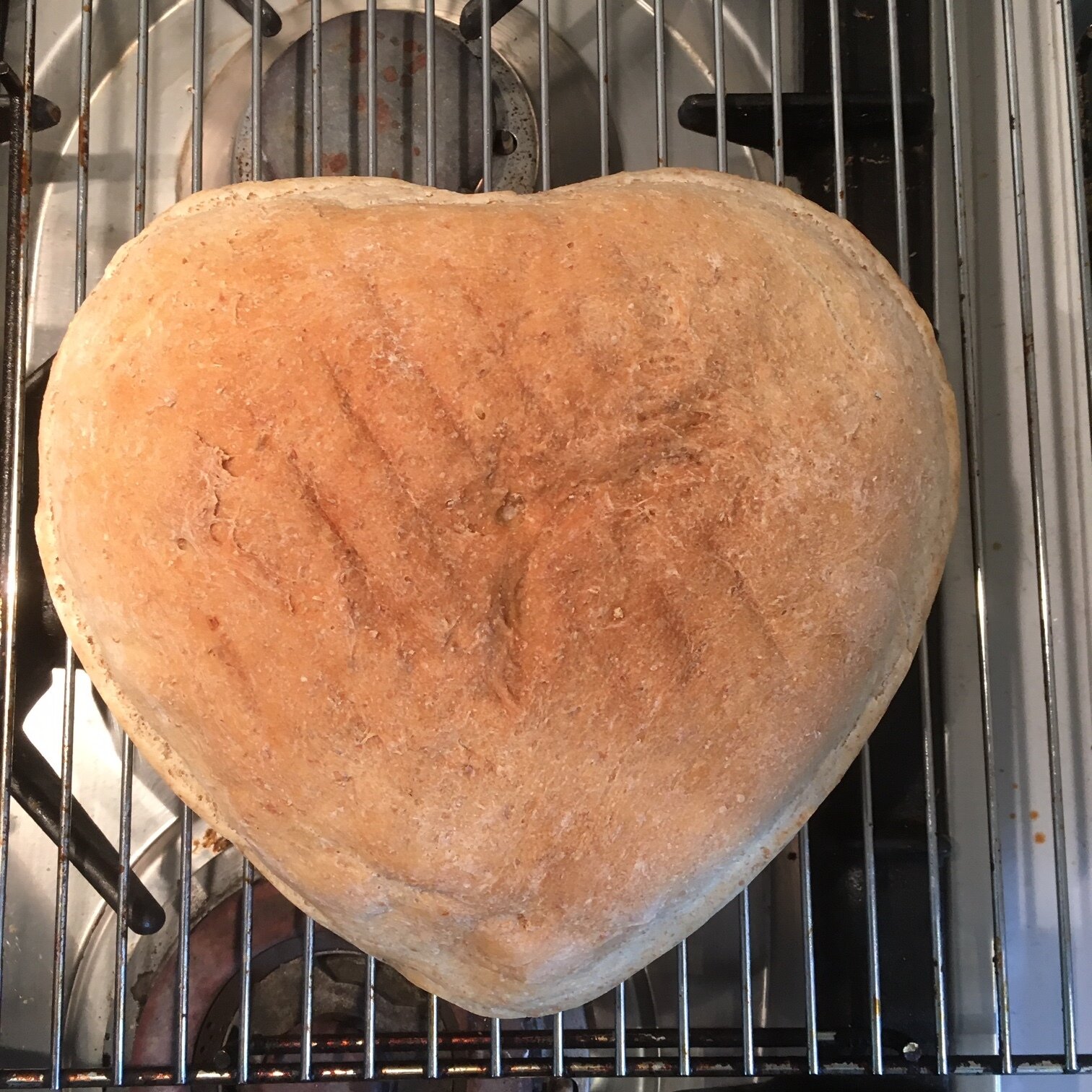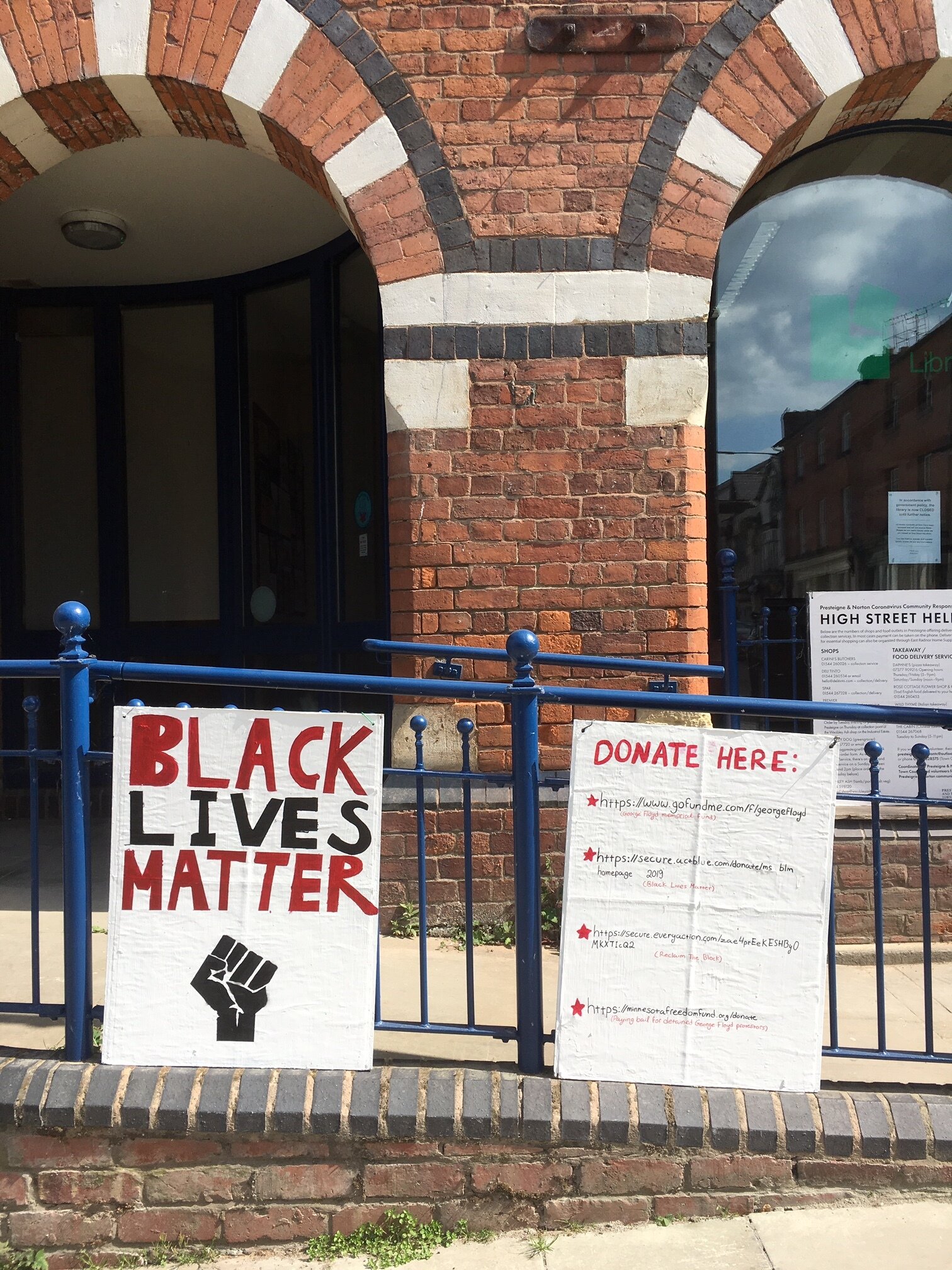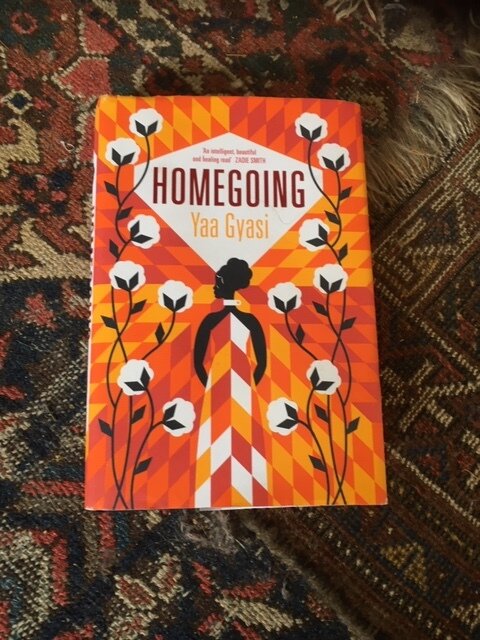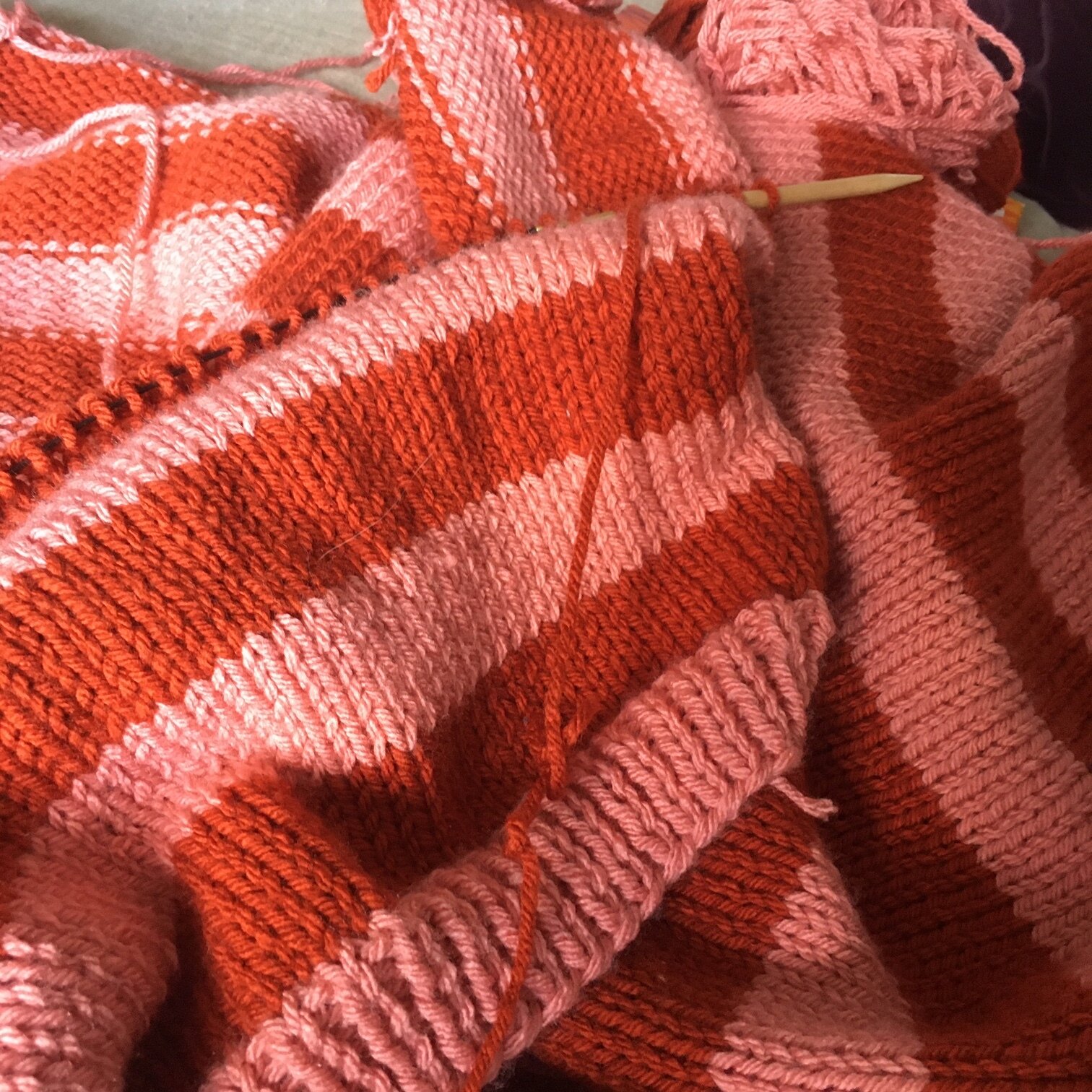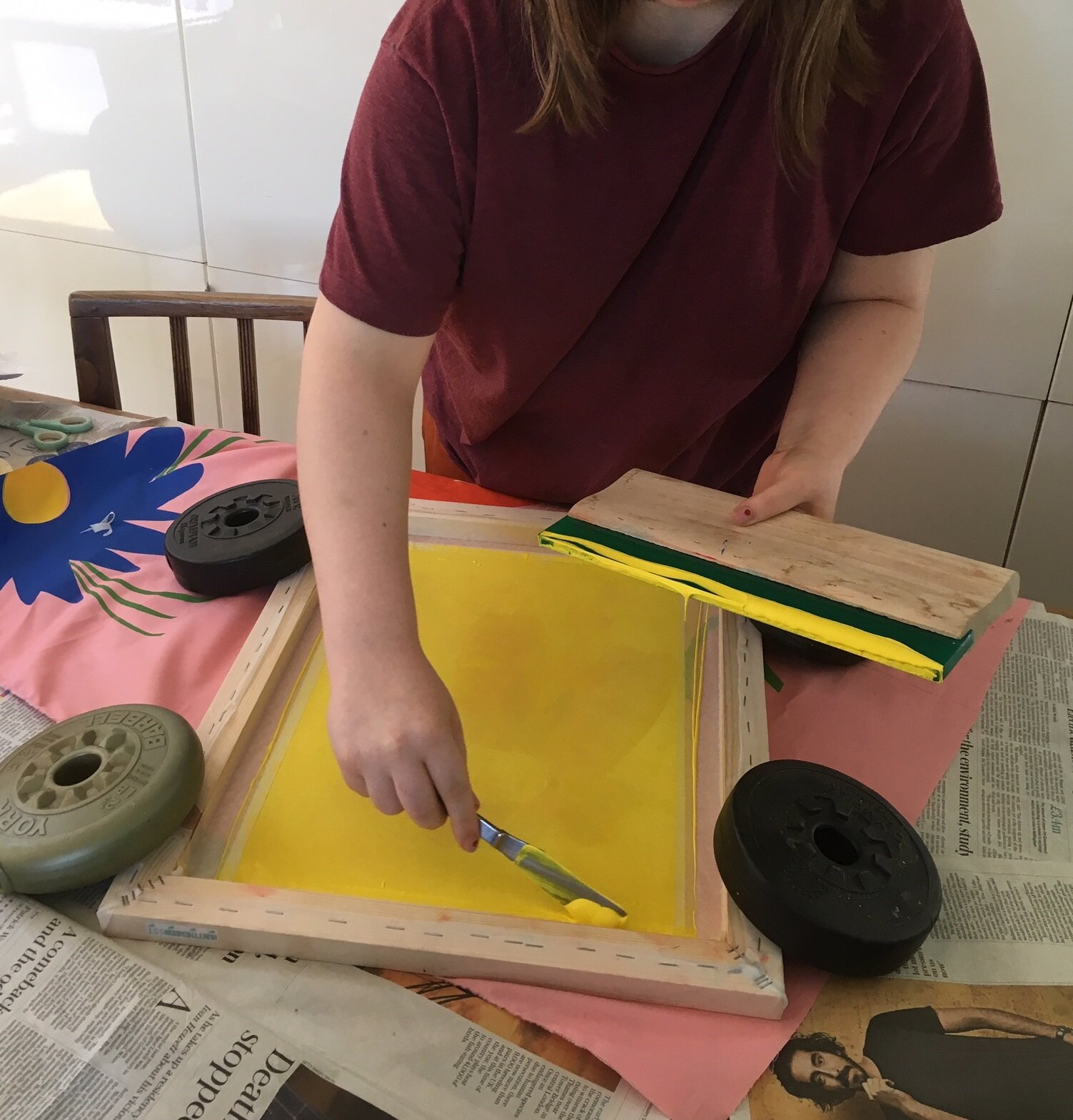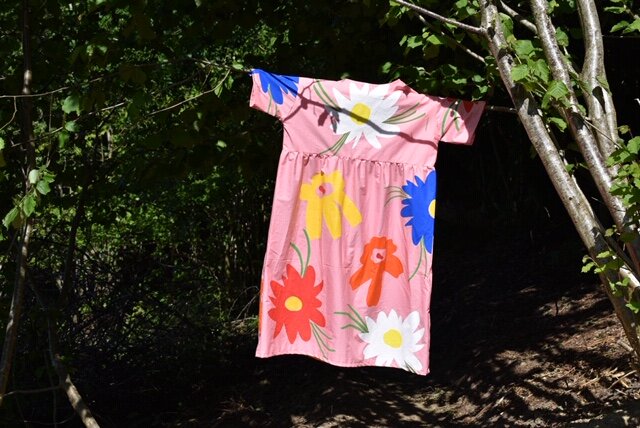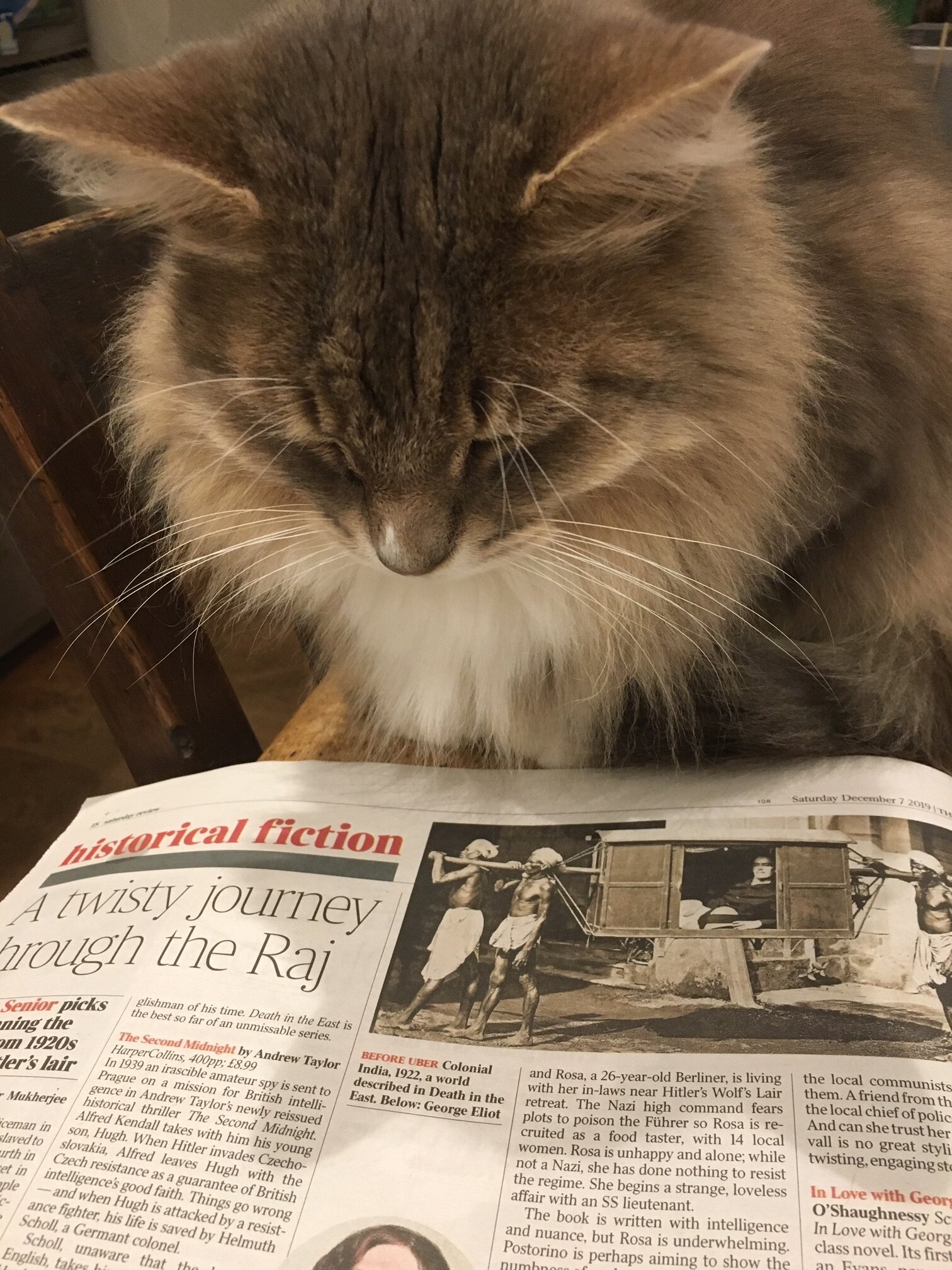Losing all sense of time
Hi Everyone and welcome to the fifth issue of the Lugg Blogg.
Will this be the last? I hope not. Who knows, well probably Sally Butler knows and it must be said that she has done a fantastic job, with her usual good humour and impeccable taste of putting together this highly entertaining publication.
This issue Pete’s video takes you back….back….back to the 1970’s. I was living part of the year in Amsterdam and one evening there was a knock on the door and it was one of my more notorious ‘bad boy’ mates. He asked if he could come in and have a cuppa as he had just escaped from the supposedly impregnable Koepelgevangenis domed prison in Haarlem. At the time I was sort of trying to write a song about Viv Nicholsen who was a British woman who became famous when she told the media she would "spend, spend, spend" after her husband Keith won £152,319 (equivalent to £3,362,478.00 adjusted for inflation to 2019) on the football pools in 1961. Nicholson became the subject of tabloid news stories for many years due to her and Keith's subsequent rapid spending of their fortune and her later chaotic life.
Since my mate was no stranger to disposing of large quantities of ill gained money in a very short space of time I decided he was the perfect person to sing this song. The next week we went round to a musician friends house to record the song but sadly the bad boy turned out to be much better at getting into trouble than singing although he did utter the line ‘They said it was a record win' with particular relish. The song then disappeared into a plastic bag full of old bits of paper with a few lines scribbled on them - which I call my filing system - until I happened upon it last month. So with the help of my computer and Garage Band I am delighted to tell you a Stratford Story.
P.S. By the way if you are wondering what a Bernie is in the last verse. It is the amount of money (one million pounds) that Bernie Ecclestone donated to the Labour Party in order to help persuade them to do something or other and strictly speaking has no place in a song from the 1970’s. It just scanned better.
Pete
THINGS HAPPEN - Tony Lawson
I’ve often wondered about intuition, the mysterious force that compels us to do something without prior thought, which then can’t easily be explained, it’s was just… a feeling. These thoughts or actions come from somewhere in our unconscious. We just have to trust them.
When editing I made a point of leaving space for a thought that ‘came from nowhere’ then built on it if it seemed promising. During the making of a film in New Mexico, I saw how that same force can radically change the outcome of a event. The film, Convoy was based on a popular song of the time about truckers and their “difficulties” with regulation and the law.
The script called for a chase scene in which a police car misjudges a tight bend, leaves the road, launches into the air, flies through a billboard and lands on a barn, which then collapses. The driver was then supposed to stagger out of the ruins of the barn. Our stunt driver worked out the exact speed the car needed to be travelling for it do exactly as the script required. He calculated its weight distribution to stop the car diving headfirst into the ground. He arranged for a reinforced steel cage to be built into the car and a special ramp was constructed to help launch the car towards the billboard. The barn was designed to collapse giving the car a soft landing and avoid injury to the driver. Everything was meticulously planned.
The day of the stunt arrived and anyone not directly involved was invited to come and watch what was expected to be a spectacular event. Five cameras were set to record the stunt, including one mounted in the car itself. As you can see from my photographs, things didn’t go to plan.
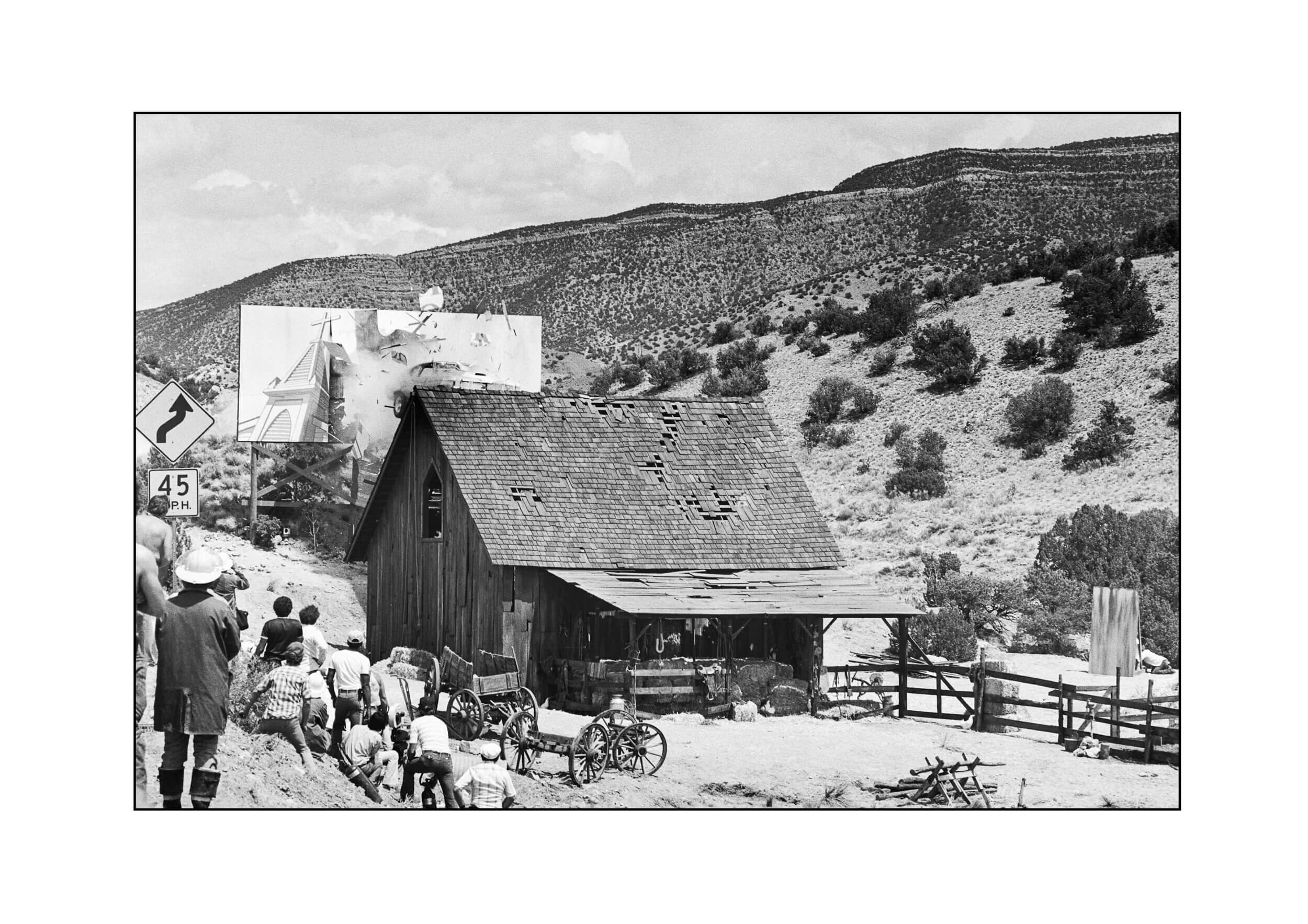
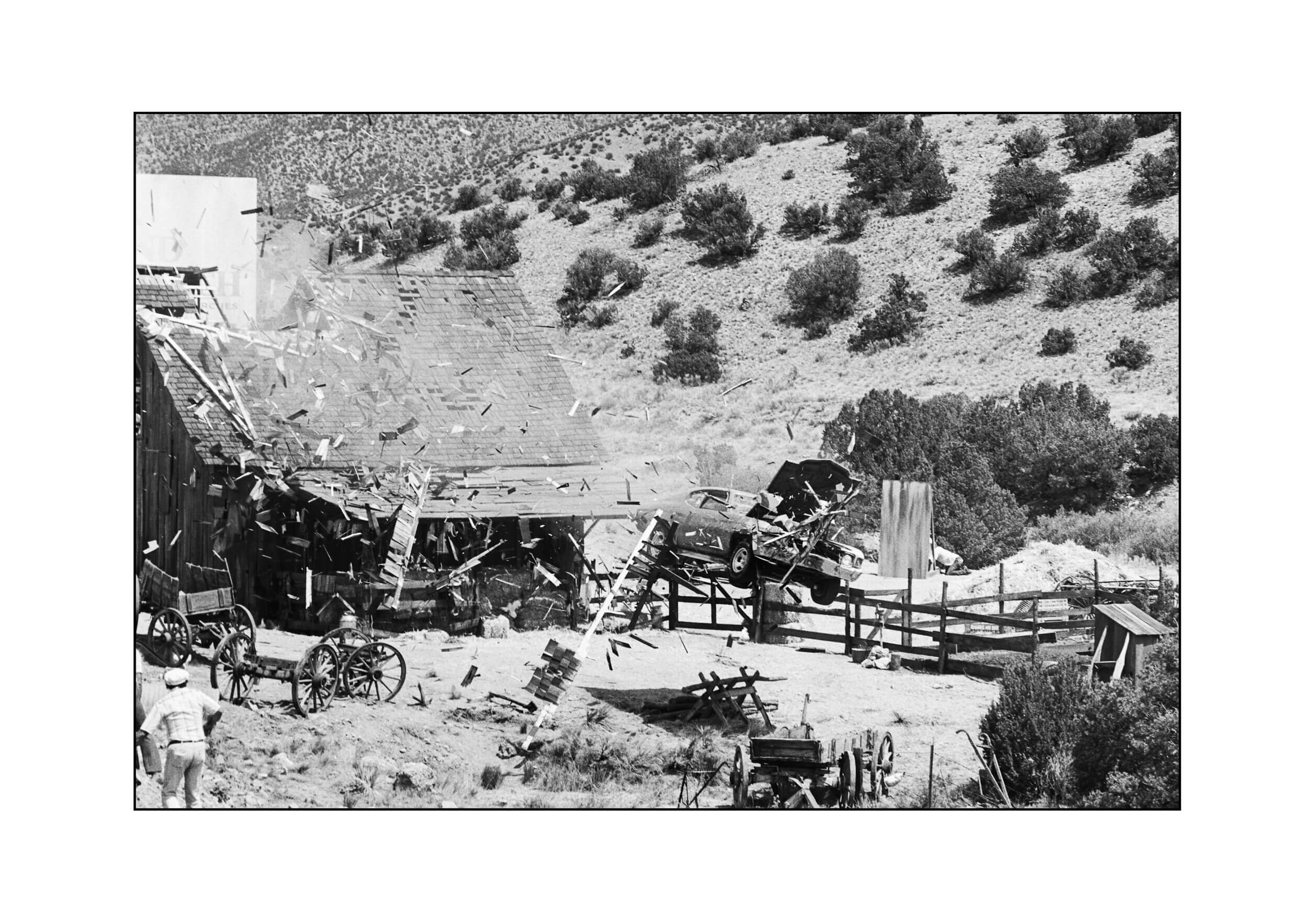
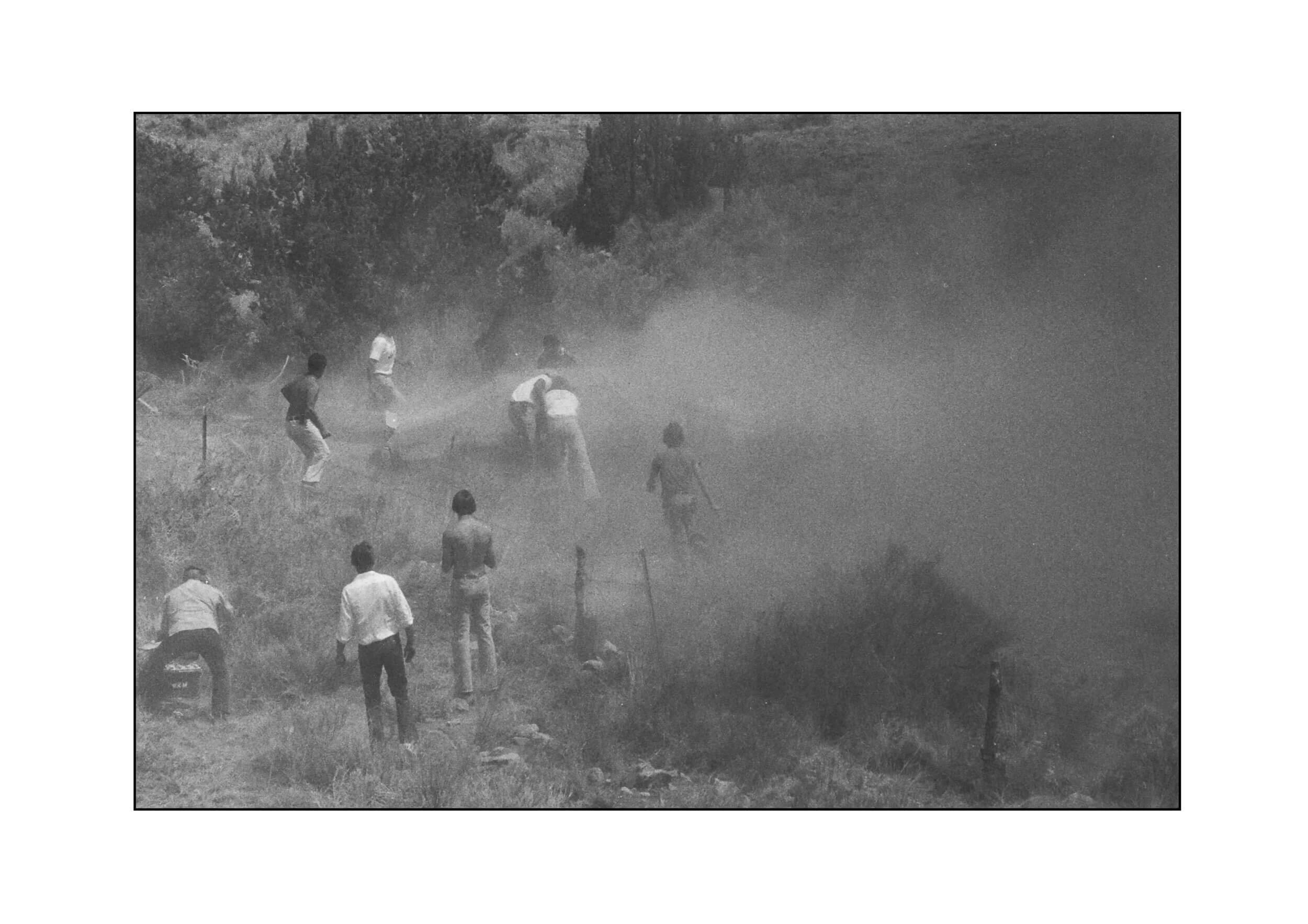
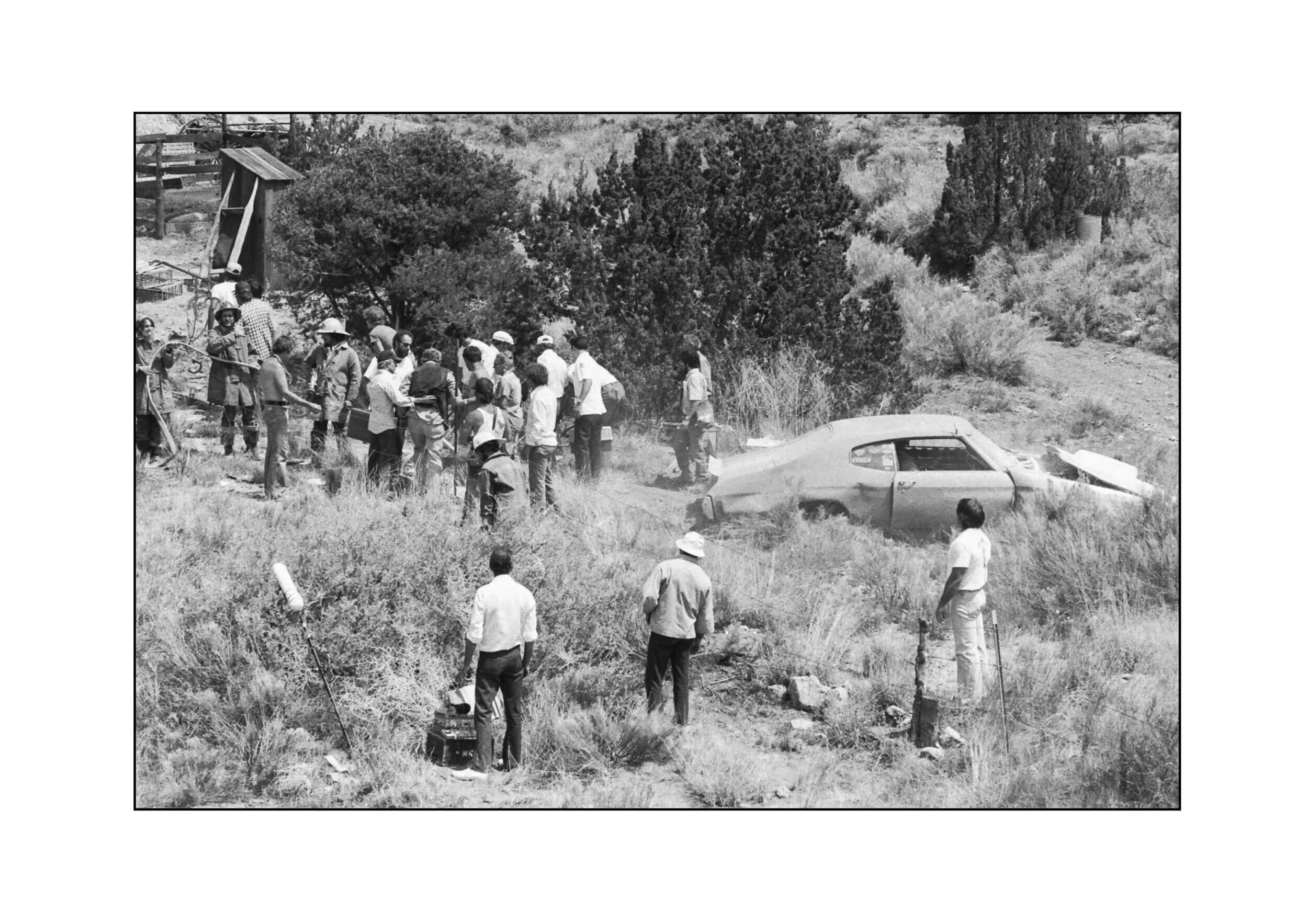
The car left the road, mounted the ramp and flew through the billboard, but went straight through the roof of the barn and landed in a cloud of dust, on very hard ground some fifty yards beyond the safe landing intended. Except for concussion and some bruising the driver escaped more serious injury, although he was very sore for a few days.
When we saw the rushes, the car-mounted camera showed that after landing, he had taken the car out of gear and switched off the ignition before he passed out. Amazingly, he had no recollection of doing that. In the shock and confusion of those few seconds, what impulse directed the actions that perhaps averted a more serious outcome.
George Vass
It’s so nice to be asked to contribute to the Lugg Blogg, especially as I’m ‘from off’ living in leafy Hampstead, nicely positioned for the Royal Free Hospital (just in case). I’ve not had a Presteigne ‘fix’ since November and am really missing the Marches – the August Bank Holiday is going to be very strange this year, the first time we’ve had to cancel the Festival in 38 years.
However, you’ll see from Alison’s article (further below) that we’ll be doing things online and, provided that the Welsh Government and the Church of England will allow us, we’re intending to present a nine-event Winter Festival Weekend in November – so it isn’t all bad news.
I’ve been quite busy rearranging the Festival, but it has been great to max-out on some fabulous online gems over the lockdown period. I have a very wide interest in music, one of my favourite things being musical theatre – I came across a lovely concert performance of Bernstein’s Candide from Grange Festival Opera (2018) with a great British cast featuring Richard Suart, Katie Hall, Robert Murray and Rosemary Ashe.
The Concertgebouworkest, Amsterdam (easy for me to say, I know) – one of the world’s greatest symphonic ensembles – came out of lockdown last week and gave the first online concert taking social distancing on board. It’s heart-warming to see this outstanding group playing together again in Beethoven’s Seventh Symphony – link here www.concertgebouworkest.nl.
To finish, three short items:
Popular pianist Tom Poster (a regular visitor to the Festival) and his lovely violin-playing wife Elena performing ‘A Nightingale Sang in Berkeley Square’ -
https://www.facebook.com/tom.poster.7/videos/10158205527678320/
The angelic voice of Russian soprano Julia Lezhneva and violinist Dmitry Sinkovsky in a beautiful Handel aria –
And finally, a lovely arrangement of ‘You have more Friends than you know’ (used to great effect in the movie Glee), by Jamey Ray with his fabulous a cappella group Voctave. They are simply phenomenal, a bit cheesy, but I just love the sheer beauty of their sound and their quiet virtuosity –
I’m looking forward to seeing Presteigne friends again when things ease a bit later in the summer; in the meantime stay safe and healthy – hopefully the Festival will be back better than ever in 2021.
Helena Attlee
Here is another extract from Lev’s Violin, the book I would have published in April. Like so much in our lives it has been deferred, but it will come out early next year. Following the story of Lev’s Violin took me to some very unexpected places. I caught trains and planes for it, climbed mountains, spent days in libraries and wood yards and attended violin-making school in Cremona. This is about going to Russia’s deep south with Lev’s wife, Julia, and her old friend Grisha. She took me to the market in Rostov on Don, where Lev bought his violin from an old Roma fiddle player in the 1980s.
There had been few scents on the cool, grey air, but then we came to the fish stalls and the smell hit hard. In the second half of the 19th century - when Rostov was both the biggest port and the biggest railway junction in the south of Russia, caviar and local fish were shipped north through Rostov to the inland markets of the empire. In those days the fish was either smoked or put on ice, unlike the lively pike, sturgeon and catfish thrashing in the shallows of plastic boxes all around me, their water supposedly aerated by rusty a oxygen cylinder behind each stall. There were boxes of crayfish beside them, with beady black eyes. Crustaceans are wasted on me. I don’t enjoy the intimacy of pulling off their legs, and prising away their shells seems a gross intrusion on their privacy. Saw off this and suck it, lever out that and lick it, I just don’t like it at all. And yet freshwater crayfish are a treat in any country, and I was ashamed of myself later that week when Julia’s friends invited us over for dinner. I just couldn’t do justice to the gigantic bowl they set down in front of me, brimming over with those familiar little bodies, their eyes so black and beady that it was as if boiling hadn’t bothered them at all.
Every stall in the fish market was decorated with golden bouquets of dried and smoked fish, iridescent in the light of a naked bulb. Asking for a delectable taste of any preserved fish always triggered the same operation, a subtle incision performed with a penknife’s fine blade beneath a fin. “Before the Revolution” Julia said, as I popped a sliver of fish into my mouth, “there was so much fish in the Don that people used to dry it and use it instead of firewood. But under the Soviet Union the river was poisoned by industrial waste, and it’s never been the same again.” “Mmmm, thanks Julia.”
The main market, with its conical hills of dried fruit, sock stalls, hat stalls, knife stalls and piles of stacked saucepans, would never have been the place to sell a violin. But then we went out to the tolkuchka, the flea market on the tram tracks outside, where the cathedral’s gilded domes illuminate the sky, the congregation mixes with the real bargain hunters, and everyone is equal when it comes to being run over by a tram. A very old woman, her feet on the tracks, offered broken tubes and boxes of household poisons from a cardboard tray. A shopping spree there could eliminate the wasps, cockroaches, rats and ants in your life, and perhaps you as well. Opposite her someone had made a nest from a few upturned knitted hats inside a cardboard box, and filled it with a tangle of stray kittens that she arranged and rearranged constantly, attempting to create an impression of sweetness from their skinny bodies and mangy faces. Someone else was trying to sell a plump Pekinese puppy, wearing it in the meantime like a sash across her broad chest. It was in this liminal place, among unwanted pets, bunches of fresh dill, radishes and broken radios, that Lev might have spotted an old man selling junk from the pavement. I saw someone very similar by the tram tracks, and he’d not got much to offer, just a dented kettle, a cup and a pair of army boots with holes in them. Lev probably had no need of another violin, least of all a dirty one with no strings. But like a man who surrounds himself with dogs, or has so many children than one more will make no difference, he would have begun, almost automatically, to embark on a bargaining strategy. He checked the kettle for leaks, held the broken boots to his feet as if trying them for size, and enquired after a saucer for the chipped cup before eventually making an offer on the violin. He could have bought the dented kettle for the same price, for in that place usefulness was the only criterion of worth, and he left the market with the violin under his arm. It had come into his life as casually as a stray cat slipping through the back door, but he recognised it immediately as an exceptional instrument.
AFTER THE GOLDRUSH by Neil Young - performed by John Hymas (strings) and David Rothon (pedal steel)
This is my arrangement for string quartet of this classic Neil Young song. I sent it to my brother in law, ace pedal steel player, David Rothon who has added a whole different dimension to the piece. I’m not sure how many compositions/arrangements there are for this combination but I think it works. This is the first of what I hope will be a series of collaborations. The video shows the view from Stonewall Hill.
AT A TIME LIKE THIS… Sarah Burton
‘How timely! How lucky!’ friends exclaimed, as my novel The Strange Adventures of H, which sees its heroine riding out the Great Plague of 1665 in a locked-down London, came into the world during the current pandemic. And of course it’s an ill wind which blows nobody any good, but with bookshops shut and literary festivals cancelled it looks as though H may well be another victim of coronavirus - and it is, after all, only a book, and with two elderly parents in care homes far away I have more significant concerns, and am well aware that many others have far more serious problems than mine.
So if I can’t share my book as widely as I’d like I can at least share with Lugg Blogg readers some of the interesting things that I learned while researching it about the outbreak of bubonic plague in 1665. The plague was not, of course, analogous with coronavirus on several levels: catching it was an almost certain death sentence and over a few months it killed a quarter of Londoners; there was no palliative treatment and no understanding of how it was spread. However its social effects, in particular its influence on notions of security, order and authority, were profound, and may offer insights on our own experience. READ IN FULL HERE - (link opens a new page).
QUEUE THE MUSIC - MBA
Inspired by the singing from the balconies in Italy, Mid Border Arts has created Queue the Music. For the last six weeks, as Saturday morning shoppers wait outside the chemist and supermarket in High Street or as they queue to buy bread in Broad Street, they can hear the much missed sound of live music and song, drifting down from the open windows of Presteigne Assembly Rooms.
Many thanks to the talented local musicians who have performed; and to those who have said they will over the next few weeks. Thanks also to Alex @Alex Ramsay photography.
Mid Border Arts
GARDEN @ No 3 - Sabina Rüber
Mockorange - the scent I look forward to most every year. Small flowers but with a powerful aroma, sweet and delicious. Over the years more than one variety have found their way home.
Philadelphus microphyllus and Philadelphus maculatus 'Mexican Jewel’.
Another plant group with irresistible scent - Dianthus:
D.‘Valda Wyatts’ and Dianthus superbus.
And roses naturally:
Out now : Rosa ‘Baron Girond de l'Ain’ and the incredibly vigorous Rosa 'Madame Alfred Carrière'.
Magnificent Alliums
Allium schubertii never ceases to amaze and Allium ‘Globemaster’ boldly returning every year.
Allium nigrum and Nectaroscordum siculum ssp. bulgaricum.
For the first time ever: perfect salad - it’s been too dry for slugs!! Yay!!
…and last but definitely not least - the first sweet peas of the season, Lathyrus odoratus ‘More Scent’ - bring it on…
THE TURTLEDOVE - Ian Marchant
I'm currently working on a book about my 7xgreat great-grandfather, Thomas Marchant, who kept a diary between 1714 and 1728. Through his wife's family the diarist owned and controlled the 'advowson', (that is, the right to confer the living of the church on a priest of his choice) of the parish of Rusper in Sussex. It was my 7xgreat great-grandmother Elizabeth Stone's home village, and most weeks, Old Thom travelled to Rusper on business from Hurstpierpoint, where he farmed. Thomas and Elizabeth intended to settle the living on their eldest son John, who died of smallpox while he was studying at Oxford in 1726, after which they sold the advowson for two hundred guineas.
This song, The Turtledove, was recorded on wax cylinder in the Plough Inn, in Rusper, opposite the church, by Ralph Vaughan Williams in 1907. It's the landlord of the pub singing it in the sample from the wax cylinder that we used for our version. It's known to collectors as 'Roud 422', after the folksong archivist and historian Steve Roud. It's one of maybe thirty songs which Roud can say for sure would have been known in the late 17th and early 18th centuries. These three pieces of evidence - the Marchant's connection with Rusper, Vaughan-Williams recording it in the Plough, and Roud's assertion that it's a 17th C song, suggest strongly that the Marchants would have known it.
I've wondered if Thom and Elizabeth would have liked the song. It might have been the late 17thC equivalent of Agadoo. Would I like it if one of my descendants in 300 years built a time machine, and travelled back to sing 'Bohemian Rhapsody' at me? No, I would not. Nonetheless, I thought I'd have a go at recording it. This version was recorded in Lancaster in October 2019 by Stuart Anthony, and produced by Paul Walmsley. The traditional music was arranged and played by Stuart Anthony, and the traditional lyrics were arranged by me.
VIEW OF THE WEEK
The amazing Stapleton Wood foxgloves.
@Alex Ramsay photography
MARMALADEGATE - Bobby
I don’t know about you, but I’ve had a lot of time to think recently. Not just about the normal day-to-day stuff, of routine: do I need to buy some more marmalade to last the week out? Where is the marmalade? Who has hidden the marmalade? Why the hell would someone steal my marmalade and then not put it back?!
No. Time and space (because that’s something we’ve been granted, weirdly, despite all the uncertainty and chaos of the last however long it’s been…) to reflect on time and space. It’s a strange paradox that some of us (of course not all of us – give me a break) have found lockdown a place of stillness and calm, while the rest of the world seems to be careering towards hell in a handcart.
Not very much happens, and that seems to be ok. And, how come there seems to be more time? Or at the very least, time appears to be trickling forwards like warm treacle.
Over twenty years ago now we moved, by serendipitous chance to Radnorshire, being lucky enough to stumble on some land for sale at Castle Ring. It was a time when our young and exuberant dreams found a place to push up against the harsher realities of trying to establish a working hazel coppice and fashioning something we could call home. Of course my vision of transforming the wreckage of a clearfell site into a productive and thriving woodland was counterbalanced perfectly by Alithea’s sheer horror at the dystopian, post apocalyptic scene of environmental carnage that confronted her (she’s over it now, by the way). She could only see brutalised tree stumps, a wasteland of pine needles and destruction. All I could see was a flourishing woodland with sunlit glades and a little wooden house nestled into a sheltered clearing……..scratch that. Who am I kidding? It was all we could afford so I “sold” the vision stuff to Alithea and she “bought” it. Big time.
That turned out to be the easy bit. Of course.
Clearing the land, replanting it with trees and dealing with the ensuing natural set backs and adversities (voles, squirrels, deer, drought, floods, pestilence, locusts…planning departments) have all left their imprint on our body and souls, but in a good way. Think about that next time you pass us in the street - each greying hair, each deepening wrinkle tells a little tale, is a little scratch mark, a reminder of the journey we’ve been on.
One of the first things we did by way of initiation into the world of land ownership was to tidy up. It always helps. Maybe it’s our way of saying we’re here, and we mean business and this is our territory. If we straighten things up, maybe the gods will be kind to us. So armed with a chainsaw and a vicious brush cutter, Alithea and I set about clearing the middle of Castle Ring, the iron-age hill fort. It was full to bursting with scrub. Gorse, broom, birch, goat willow and remnant stunted conifers from the days it had been a Forestry Commision tree nursery. Yes, I know, ironic isn’t it. The first thing we did on purchasing a woodland site with virtually no trees, was to fell some more!
Perhaps feeling some remorse for this delinquency, we spared a few tiny oak saplings as atonement.
Which brings me to the here and now and the point of these musings.
It seems to me that we may feel bound and stuck and maybe a bit lost in a strange place and time at the moment with little prospect of ever getting within 2 meters of anyone ever again, let alone giving them a hug or a snog. My little offer of hope is that things change. Slowly. Inevitably. Our frail and vulnerable oak saplings endured. We’ve watched in wonder over the past two decades as they have filled out and transformed, and are always reminded of their lucky beginning. The tree stumps and pine needles have disappeared and have been replaced by a lush and thriving woodland. And if you look carefully, you can see a little wooden house in the middle of a clearing with some smoke drifting lazily up from the chimney…
And guess what. The marmalade was right there, all the time! Where I left it!!
BEFORE
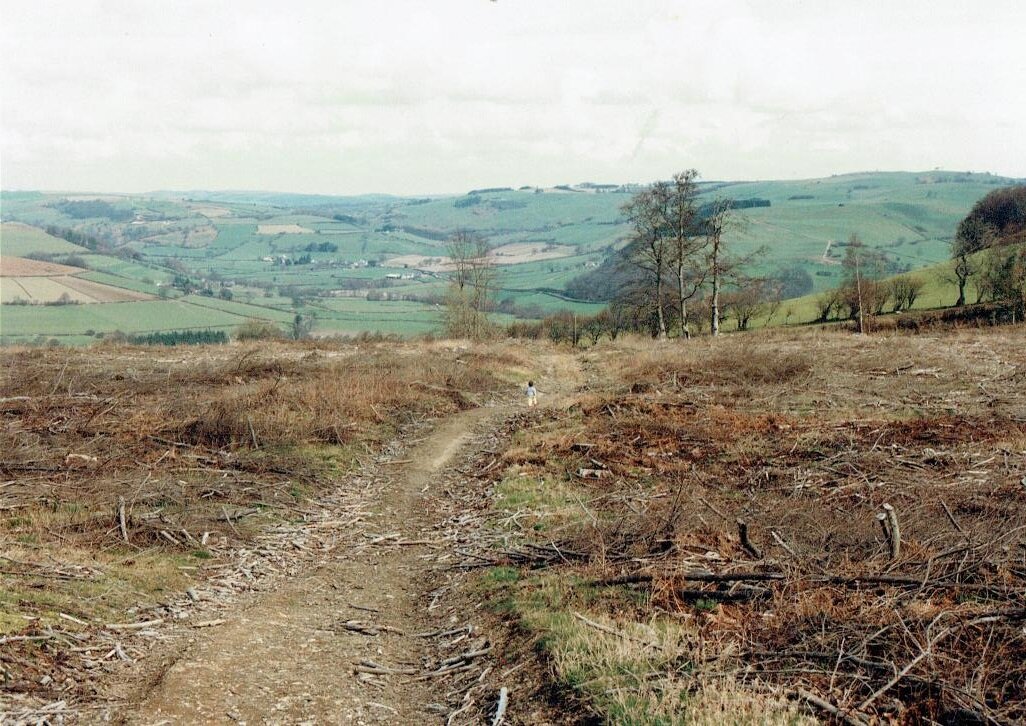
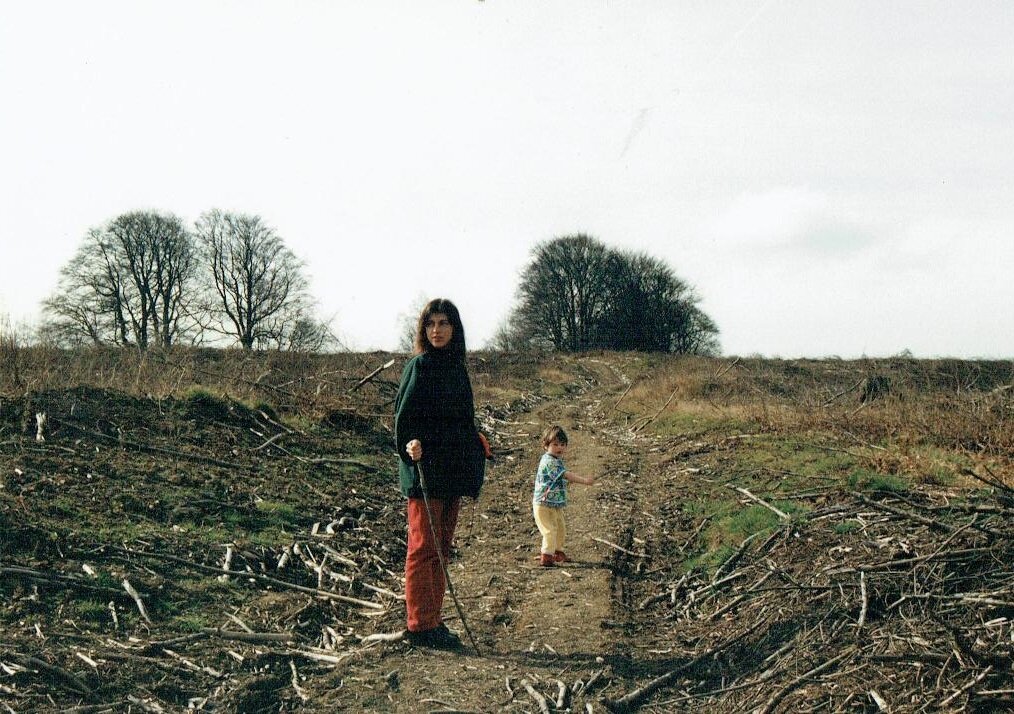
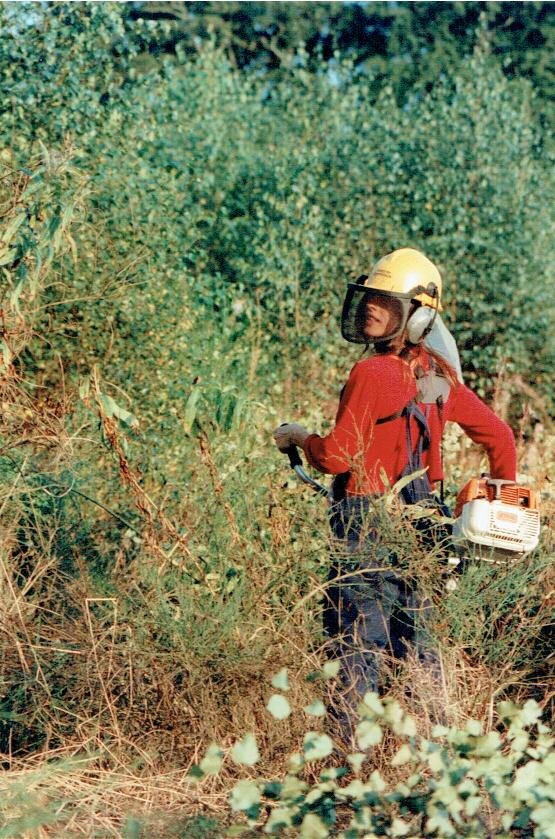
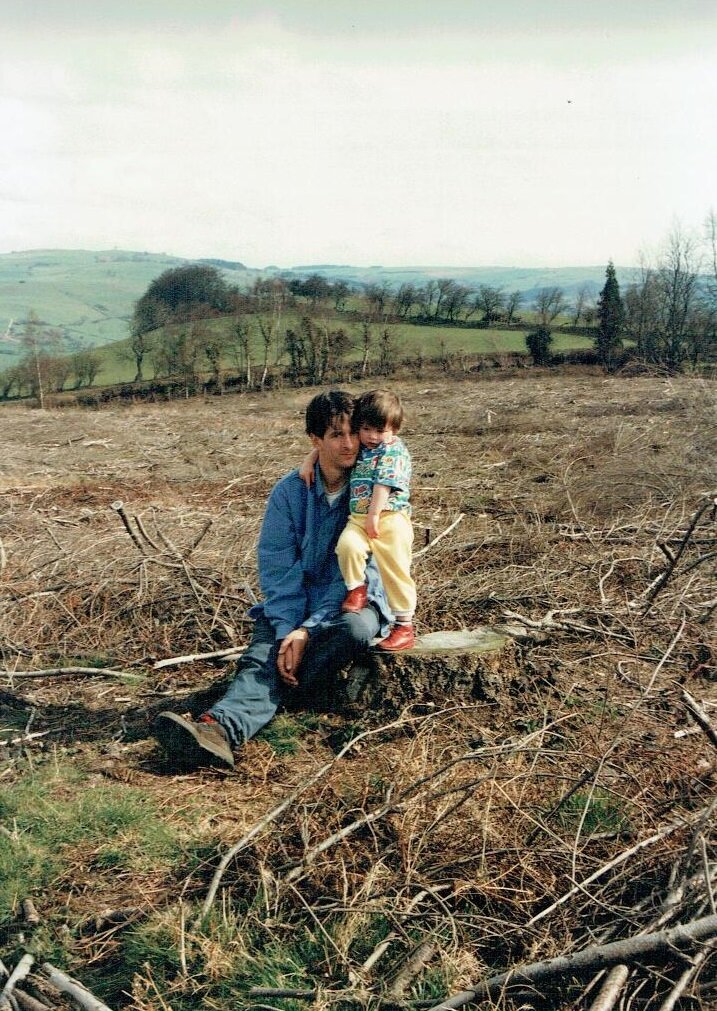
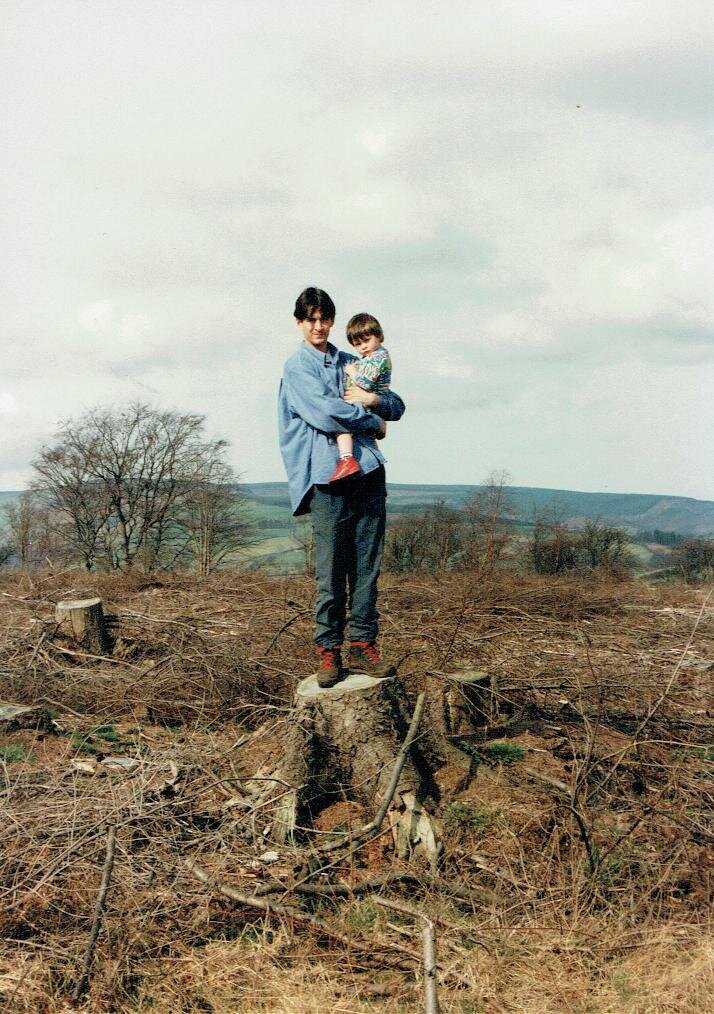
AFTER
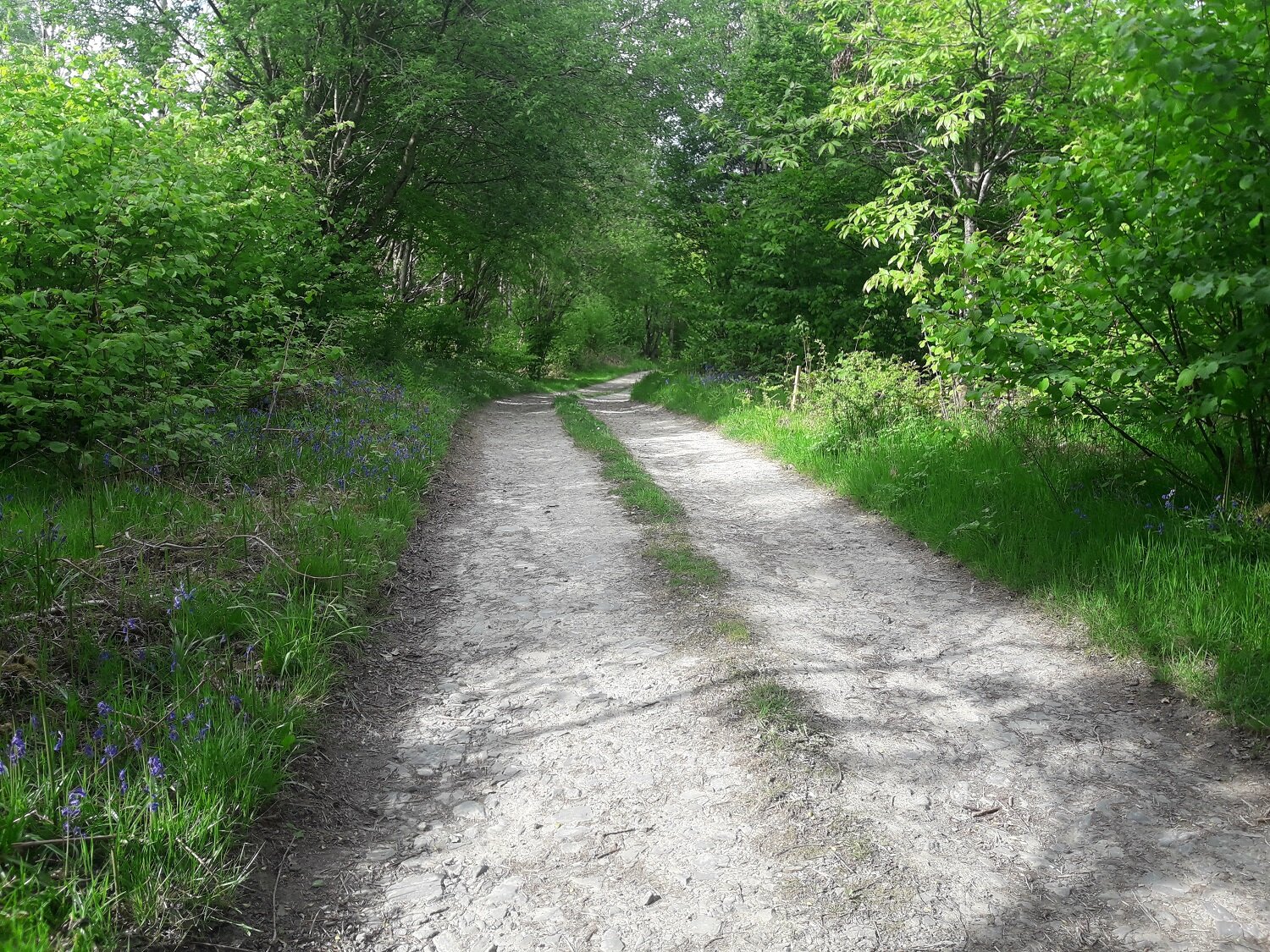
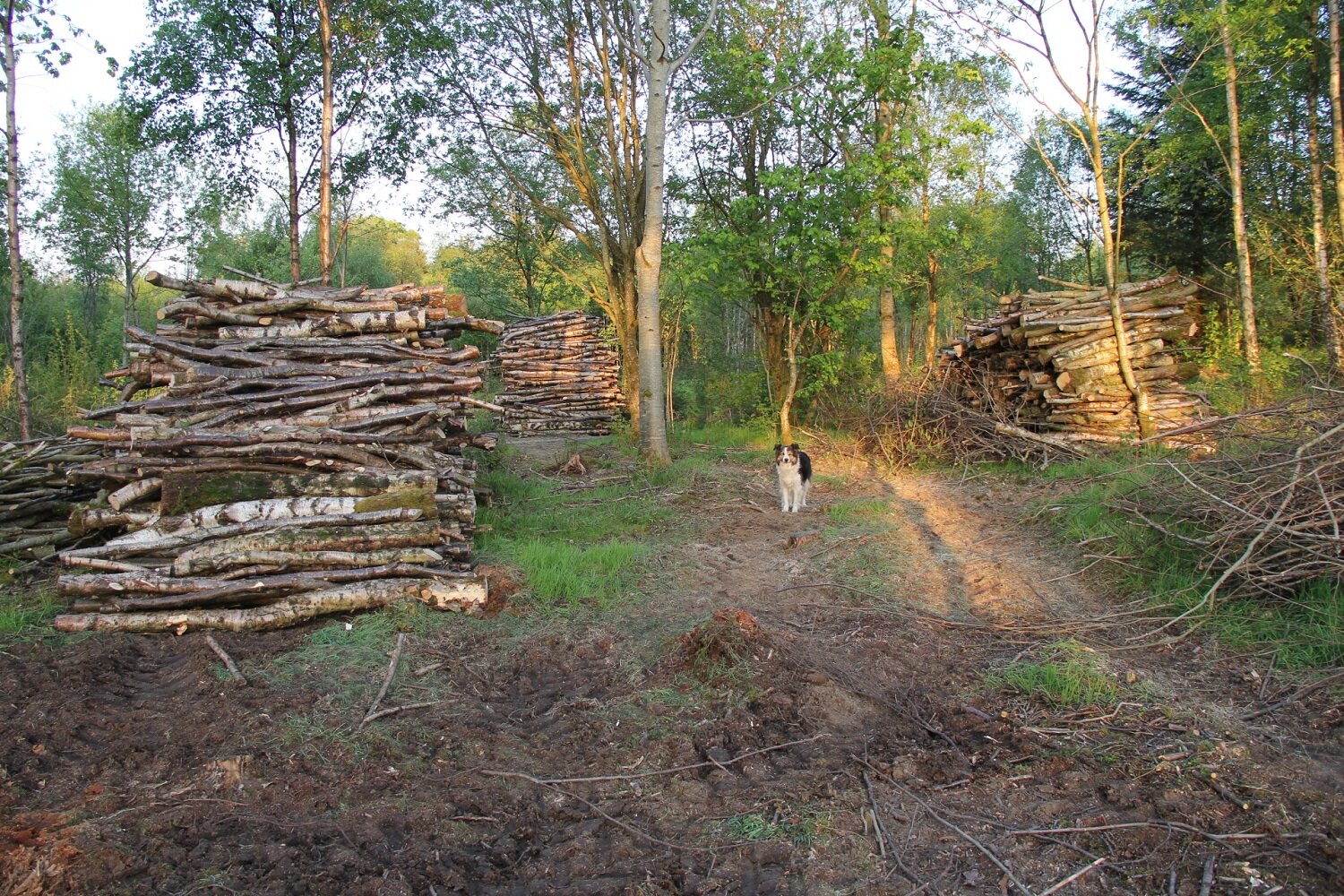
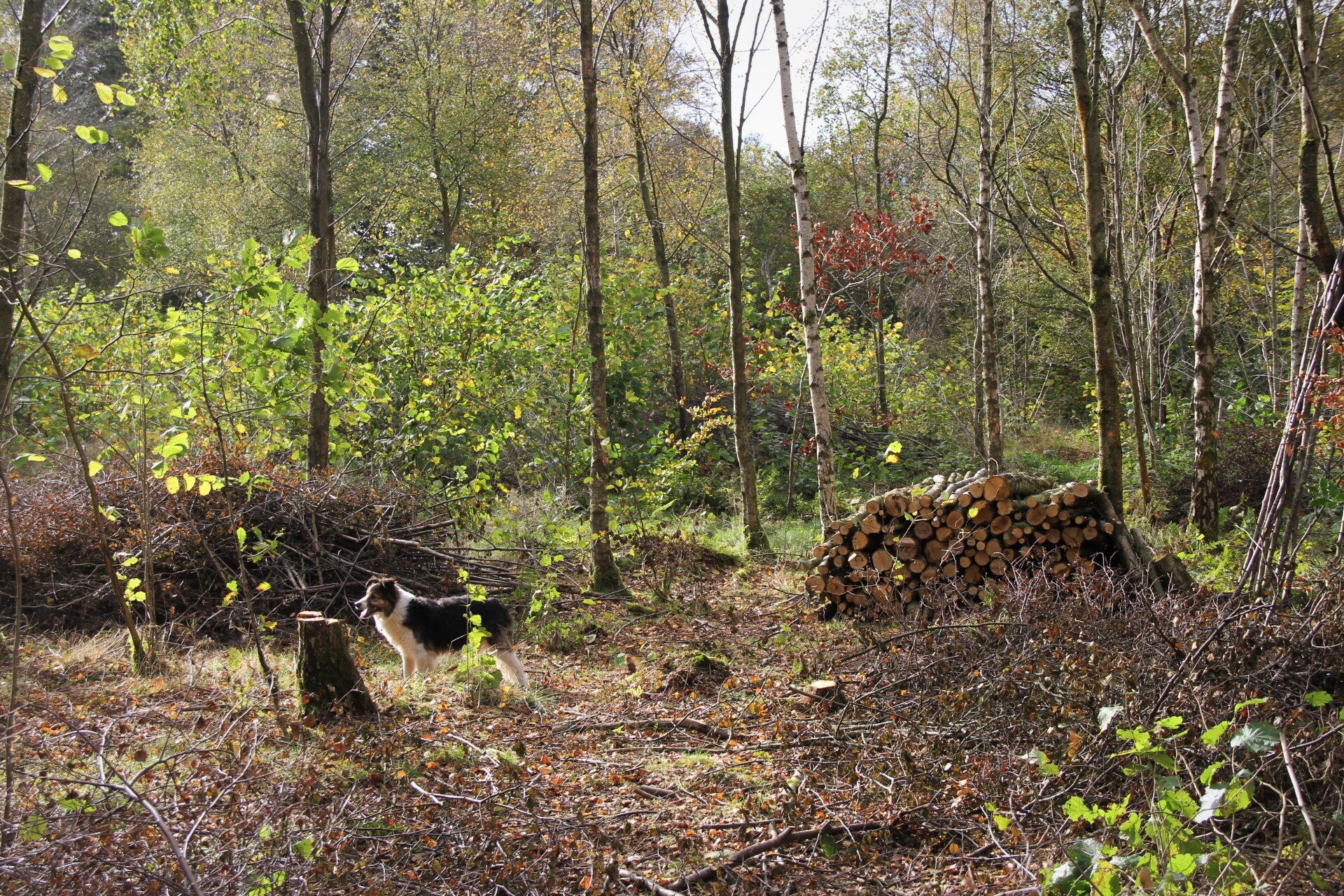
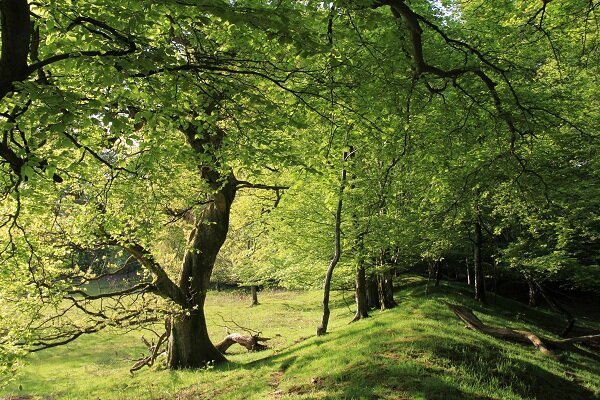
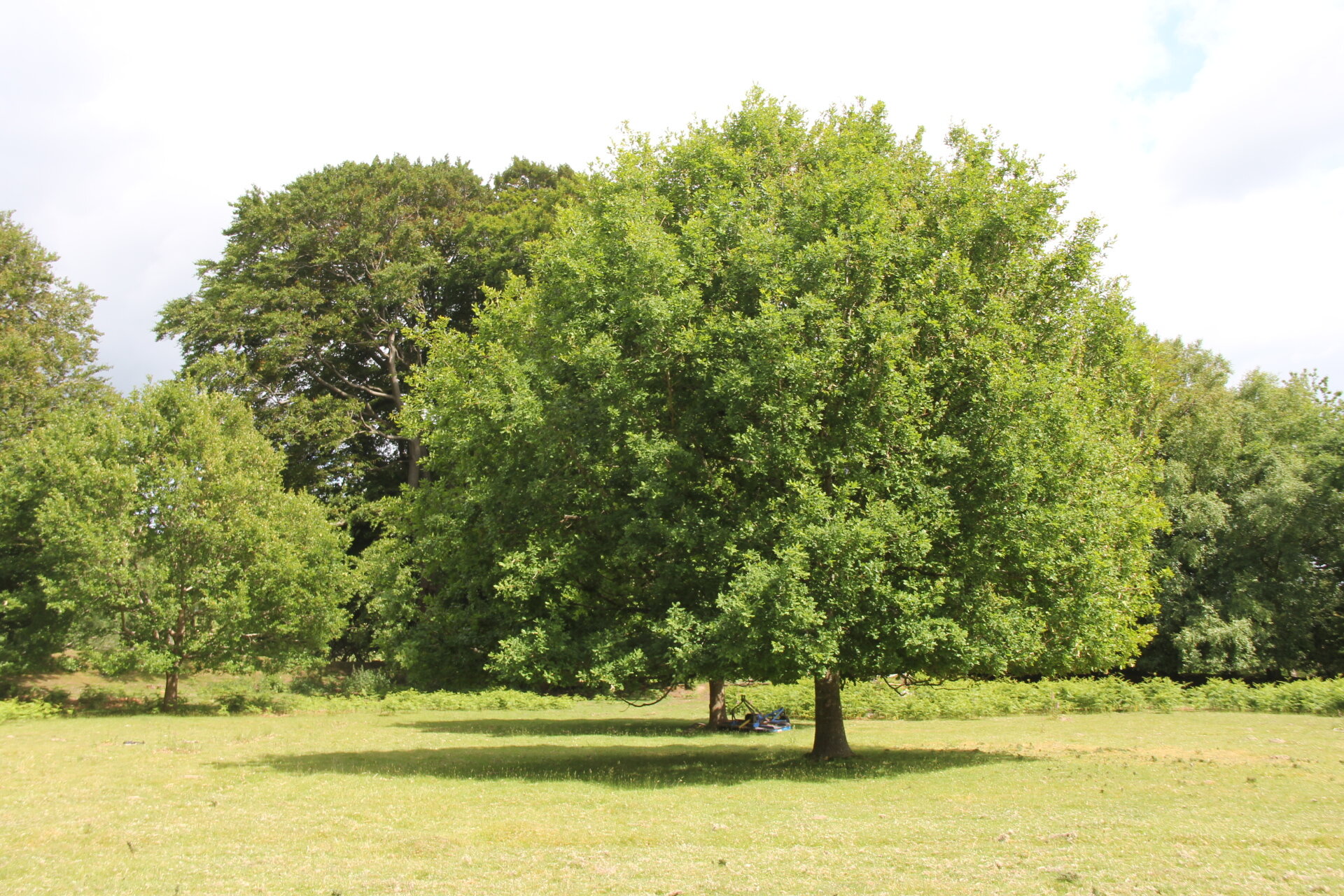
HOW I SINGLEHANDEDLY SAVED THE BRITISH MUSIC INDUSTRY (oh alright, with a little help from my friends) - Mark Williams
My last Lugg Bloggery alluded to my undeservedly charmed life as a rock journalist in Los Angeles, but I’d begun scribbling about rock-a-boogie a decade earlier in the UK underground press, and somewhere in between the two I singlehandedly save the British music industry from collapse… well sort of. In 1976 I’d launched WhichBike? for Bunch Books, a maverick little magazine publishers created by fellow undergrounder, great friend and long-haired beardie, Felix Dennis which quickly outsold the erstwhile market leader, Bike, another motorcycle mag I’d founded in 1972. But whilst WhichBike? was going from strength to commercial strength and was great fun to run, Bunch suddenly found itself moving in yet another direction – ‘suddenly’ being the operative word.
With a new editor in the WhichBike? hot-seat, or perhaps that should be saddle, I was able to resume writing about rock music, in particular for IPC’s weekly Melody Maker where I hacked out features and a weekly column – all-in-all a nice little earner and also great fun. But IPC’s decision to lock out its staff after the collapse of protracted union wage negotiations meant that not only was my freelance income rudely curtailed, but both Melody Maker and its sister paper, New Musical Express, were off the streets. As a result, there would be a ton of record company advertising and circulation income sloshing around with nowhere to go and record shops and venues desperate to keep their punters punting.
At an impromptu late-night board meeting, Felix – himself a mean R & B drummer – and our fellow Bunch directors didn’t need much cajoling to seize this opportunity and a frantic seven days later the first issue of a weekly, New Music News, rolled off the presses. Of course, this was only possible due to my then girlfriend, Mikki Rain, and her fellow freelance designer George Snow being available at virtually no notice, and some massive juggling of Bunch’s already stretched resources which saw us working around the clock and literally on the stairs and landings in Bunch’s Fitzrovia offices. Despite the barely controlled mayhem, NMN followed the tried and tested NME and MM tabloid formulae of news, reviews and features covering both mainstream pop and more cultish, post-punk trends, but where it differed from the IPC titles was in its hugely tongue-in-cheek, often self-deprecating tone.
Although much of the content was written by ex-underground freelancers who had gravitated to music journalism like Barry Miles, the brilliant if deadline-averse Tom Hibbert, Richard Meltzer and indeed myself, it couldn’t have appeared without the input of several moonlighting IPC journalists, often under preposterous pseudonyms. One who wasn’t afraid to use his own name was my friend Mark Ellen, then of NME and later of BBC 2’s Old Grey Whistle Test, editor of Smash Hits, Q and latterly the late-lamented The Word. Here he dons the rosy bifocals and leafs through his personal NMN back-pages.
‘This was the freewheeling, head-spinning world of the underground press that, being too young, I’d never been part of and it was so exciting. But when I first met Felix I had a very clear idea that he was a fantastically shrewd commercial operator but wasn’t as interested in the political dimension of what he was doing as he had been with Oz. So why was he doing NMN ? I may be completely wrong, but I felt it was a nostalgia exercise for him, to go back to having a basement full of people, rammed full of exotic substances, writing photo captions, measuring pictures and bashing out headlines, trying to pull something together under extreme duress.
‘We took huge amounts of speed and drank cans of Red Stripe and just worked through the night, hence these incredible captions and daft headlines being written at four o’clock in the morning – people were just way off the beat by then. I remember some of the page footers, mostly written by Mark: “Out of our heads and on to the streets”; “The Godzilla of the gutter press”. But you’d work around the clock to produce this thing, this mad beast, because you really believed in it. And you’d think it’s so far removed from rock’n’roll – but it was brilliant and that sort of mad, made-up journalism went on to become so important in Smash Hits and Q. The whole thing was so thrilling and the personalities… well, although it’s ridiculous to think of it like this, it was an incredibly close family.’
On Friday nights everyone was so knackered and we never had any money... actually we didn’t do too badly, we were paid cash in brown envelopes… but we’d go and eat at this Greek restaurant and get really drunk and whip up a great euphoria about us and New Music News against the world. And we’d suddenly realise at eleven o’clock that the damage was done and we’d racked up this enormous bill which none of us could possibly pay – so we’d just order more drink! Eventually I went over to the manager and said, ‘I’m sorry, we’re going to have to wash up or something’ and he said, ‘it’s fine, a man came in and it’s been taken care of.’ I asked, ‘What did he look like?’ He said, ‘Longhair and a beard.’ Twice that happened, and I was very touched by Felix’s largesse… he’d recognised how very, very hard we were working on his behalf.
Although the music industry had nowhere else to go, and I and my decidedly picaresque NMN cohort were being feted by grateful if equally opportunistic record company execs, there was still that element of music having a political dimension to it and being vastly important, which it no longer really is. But for whatever reasons the industry was generally supportive of NMN and of the fact that somebody wanted to keep the guttering candle of the pop weekly alight in this nasty political crosswind. And so with sometime WhichBike? advertising manager Richard Howell on board, the paper was instantly stuffed full of ads – although the circulation lagged rather far behind.
Inevitably, IPC eventually settled with their journalists and after seven weeks NME and MM returned to the fray. Heavily undone by exhaustion and too many bad drugs, I felt that the jig was now up and we should close the willful little upstart. However Felix and many of the staff believed that it was worth carrying on, and so after some ‘robust’ disagreement I resigned... and then went to sleep for literally 24 hours. But it was only a couple of months before the advertising and what relatively little circulation remained had hemorrhaged to the point of silliness and Felix finally admitted defeat.
In a fit of pique after a night of intensive liquid commiseration in our staff canteen, i.e. the Marquis of Granby pub, the then editor, whose name I will respectfully omit, tried kicking down the front door of our offices. It was a fitting and very rock’n’roll end to what was arguably one of Bunch’s, and although I immodestly say so, my own finest hours.
Follow Mark’s Covid Coping Chronicle at www.markswill.wordpress.com
WILDFLOWER VERGES ON PRESTEIGNE BYPASS @Andrea Gilpin photography
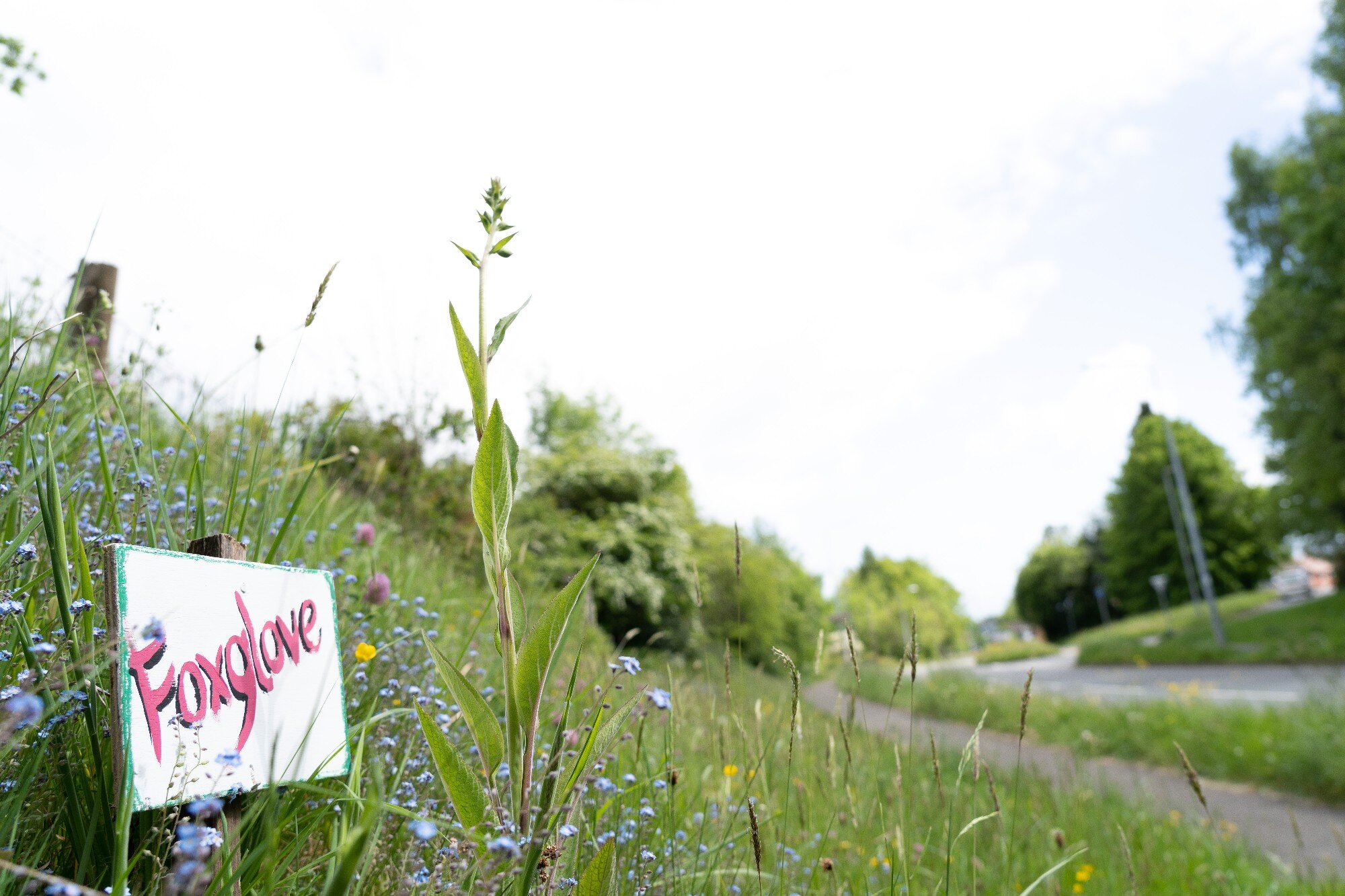
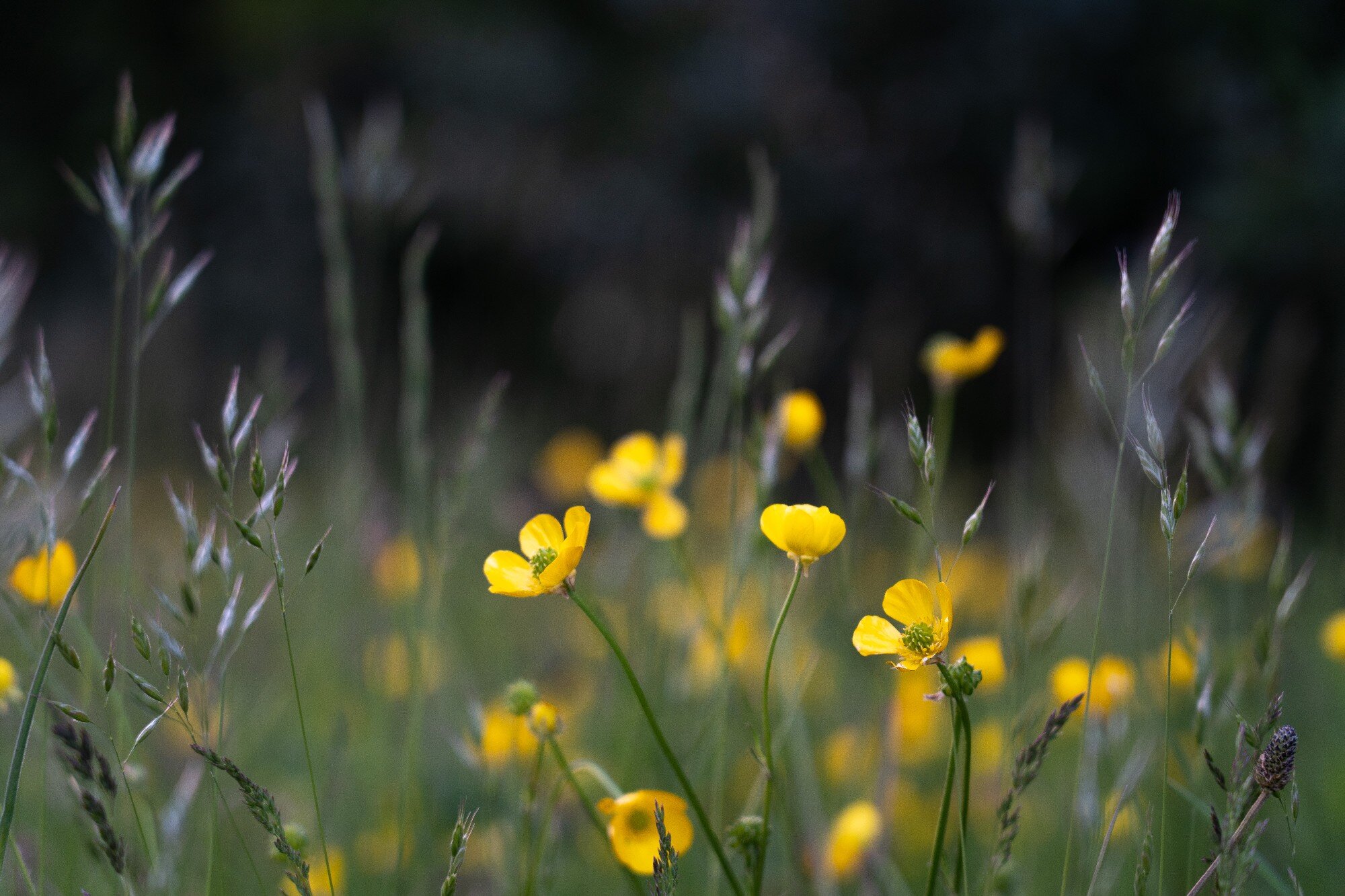
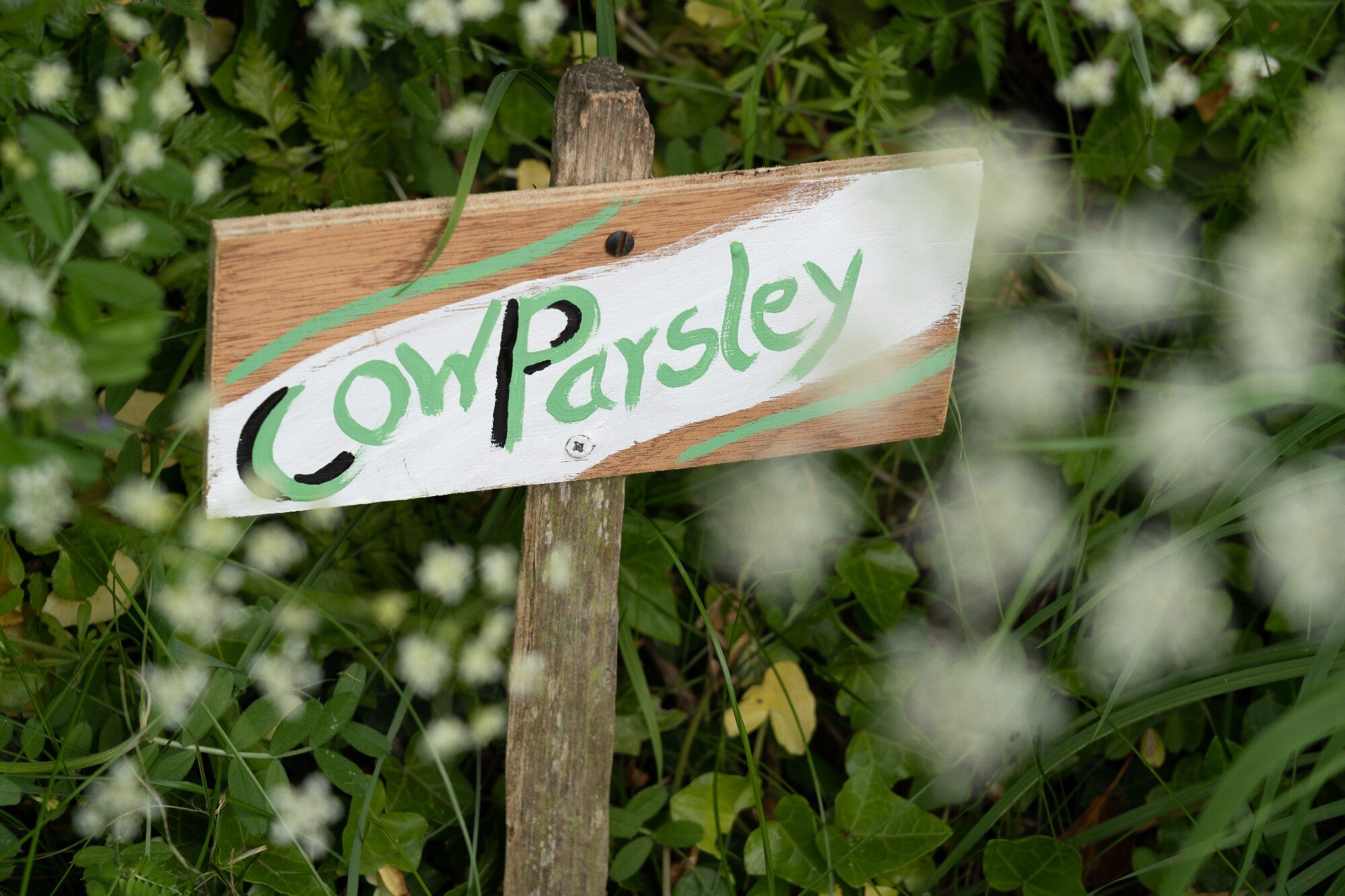
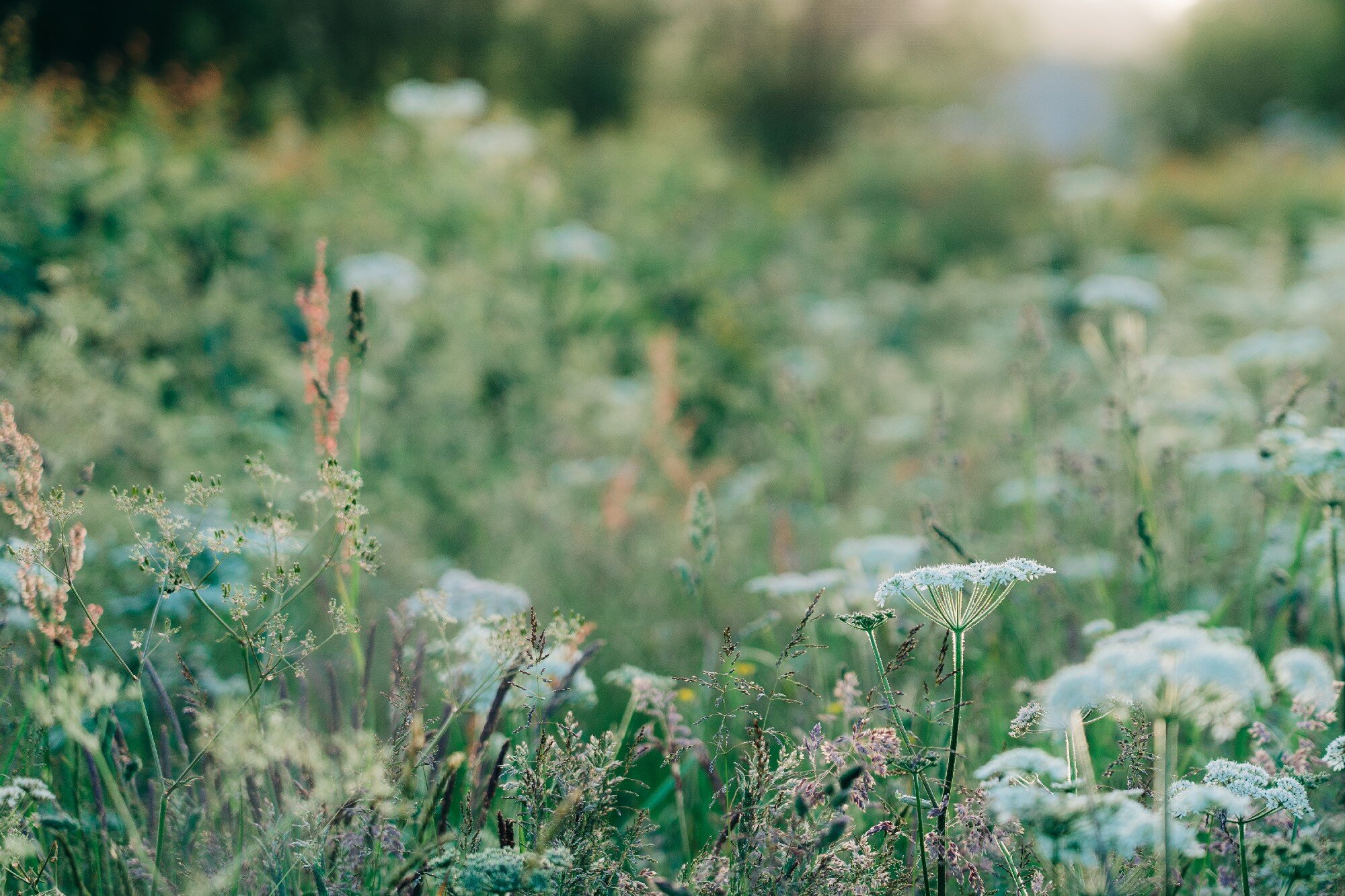
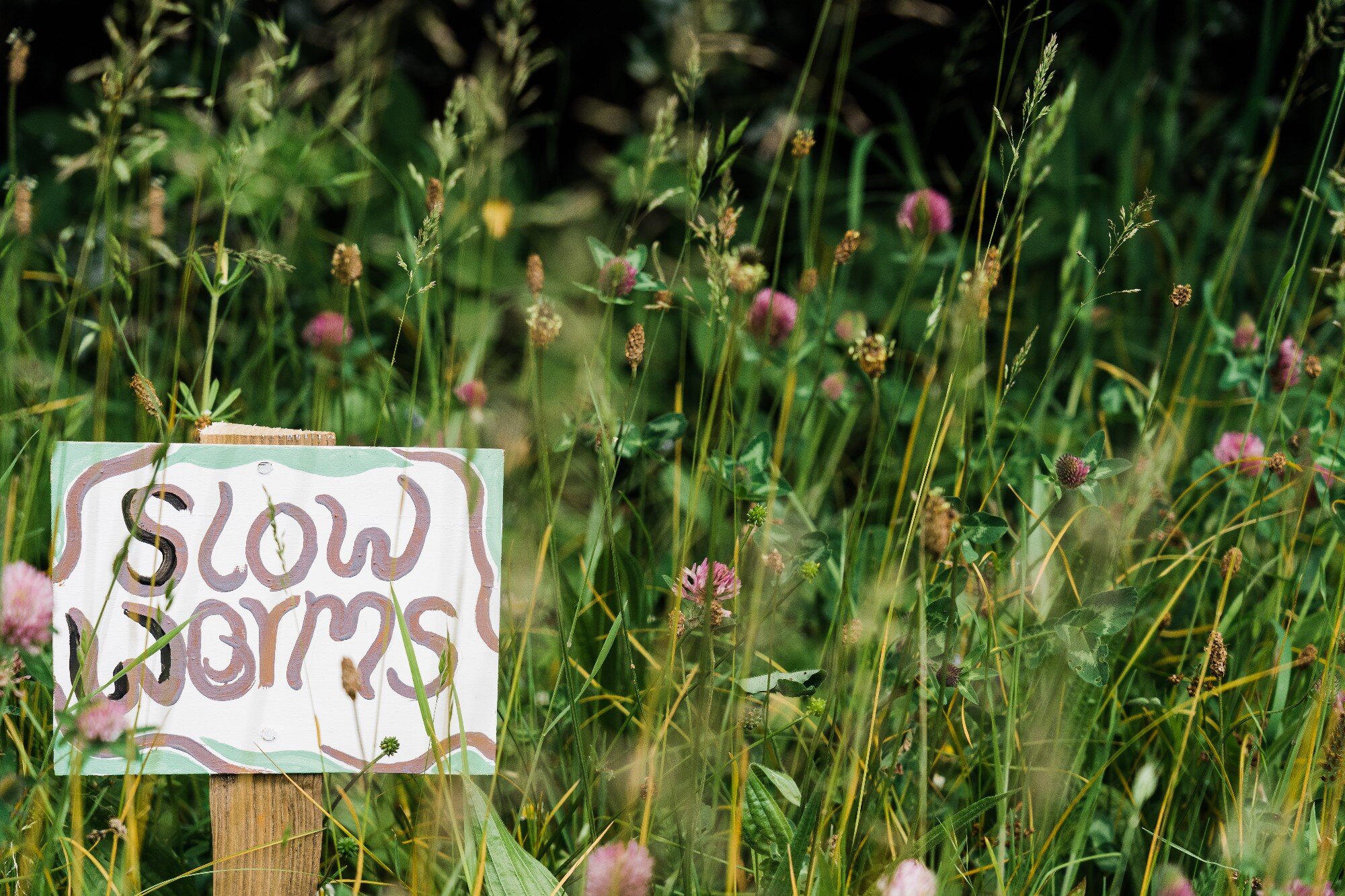
The verges below the Warden are particularly rich in many species of wild flowers and grasses. There is a growing awareness of the importance of verges; many have a range of flowers, which if left to grow, provide a valuable source of nectar and pollen. The wildflowers and grasses on the banks have been beautifully labelled to raise awareness of the beauty and diversity of our local verges following the council’s agreement to reduce cutting this year.
The wild flower flier, below, was designed by Anne Belgrave to help identify the different flowers. The project was created in the hope of encouraging more children and adults to be aware of the importance of wild flowers and insects - and so far there's been a really encouraging response.
Alison Giles
The Royal Opera House and Royal Ballet #OurHouseToYourHouse project has put out a ballet which premiered early this year called The Cellist. It tells the story of Jacqueline du Pré and her early blossoming into one of the most remarkable musicians the world has known. Its creation features in a very interesting BBC documentary shown recently, Men at the Barre, that focuses on the male dancers of a company rather than the usual prima ballerina. This is still available on BBC iPlayer here. The ballet has a lush, wonderful score that references the music that resounded through du Pré's life and career.
For those who have not seen the news elsewhere, Presteigne Festival has announced that it cannot go ahead as planned with its dates this August.
It was an extremely difficult decision for the Board to take, but it was decided that the wellbeing of everyone involved in the festival and the wider community here in Presteigne must come first. However, we have managed to arrange an alternative to the 2020 Festival comprising Presteigne Digital (a series of specially-filmed mini-concerts to be streamed via the Presteigne Festival website), a Winter Festival Weekend and the Festival Orchestra’s first commercial recording project for the Resonus label, highlighting past Presteigne commissions.
Presteigne Digital, which runs from 24-27 August and will be available to view at any time after that, features performances from the Carducci Quartet, Amy Dickson, Christopher Good, Clare Hammond, Tim Horton, Mathilde Milwidsky, Bradley Smith, Oliver Wass and members of Nova Music Opera in repertoire which was to have been featured at the 2020 Festival – six newly commissioned works from Martin Butler, Amelia Clarkson, Ninfea Cruttwell-Reade, Robin Haigh, Joseph Phibbs and Emma-Ruth Richards, contemporary British pieces and music by Beethoven, Britten, Janáček and Schubert.
The programme for the first ever Presteigne Winter Festival Weekend will be announced in mid-August. This will be a nine-event celebration of string and vocal chamber music supported with literary and music talks, similarly comprising content originally to have been featured as part of the 2020 Festival. These events will be given to a small, socially distanced audience at St Andrew’s Church. The dates have been set for 27-29 November, coinciding with the first Sunday of Advent.
The Festival is extremely grateful to many of its grant funders and individual patrons for agreeing to maintain financial support at this difficult time. These alternative projects, and the 2021 Festival, would be impossible to realise without their understanding. Irrespective of this generous assistance, ticket income so vital to our organisation could be reduced by as much as £24,000. Finances and the Festival’s future are delicately poised.
Many freelance artists are struggling financially due to the effects of COVID-19. In staging the activities above, the Presteigne Festival is now able to guarantee much needed fee or cancellation payments for all the artists who had been engaged to come to Presteigne.
Artistic Director George Vass commented ‘Whilst this imposes extra financial stress on the organisation, artists and composers form the very core of our activity; without them the Festival would be nothing at all – we have to support them all we can’.
This is the first time in 38 years that the Presteigne Festival has been forced to cancel. It is hoped that this will be the last – we’re currently planning the 2021 edition, the dates of which are 26-30 August next year.
CELESTIAL WEATHERVANE - Pete Smith
This weathervane is a continuum of a theme explored in a previous weathervane where celestial body positions were used to give direction. North Star and three suns, one full to give South and two semi darkened to represent equinox sun rise and sunset. Those positions have been reused here with the addition of four half suns on the dial only.
The four half Suns on the inner circle represent the extreme winter and summer sunrise and sunsets positions marking the passage of the year to positions 40 degrees either side of the equinox sunrises and sunset positions of East and West respectively. These four solar positions do not align with Ne Sw etc and are 5 degrees out, the suggestion is that these solar positions were, and still are, critical knowledge for both direction and marking seasonal change that are still in use today all over the world in low tech communities.
The Earth rotates at 15 degrees per hour and this is reflected in the spacing between the copper boat nails, each 15 degrees marks an hour in time, the division of 360 by 15 produces the sum 24, or 24 hours, or one day. It comes as no surprise then that 06.00 is in the equinox sunrise position and 18.00 is in the equinox sunset position when the actuality is within about ½ an hour of those times. 12.00 is due South which places 24.00 or 00.00 to the North.
WHAT DO TEENAGERS DO DURING LOCKDOWN? Phevie Katsaites and Esme Carter
Reading - baking - poster making - studying - sleeping - dancing - drawing - Kitchen Disco - online yoga - walking - aerial hoop - paddling - screen printing - knitting - sewing - hanging out with pets.
Finally - THE QUIZ!
(Answers here)
And just a reminder, if you would like to contribute something in the form of art, photography, music, travel, Presteigne history, literature, local lore, gardens, food which you think might fit into future issues, please send your stuff to luggblogg@outlook.com.

























